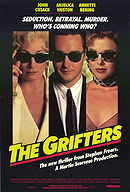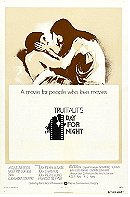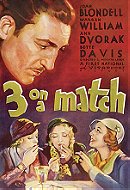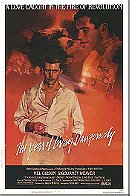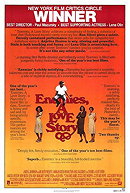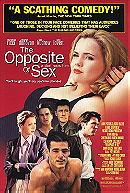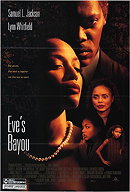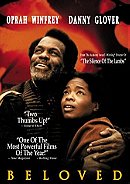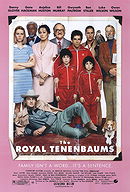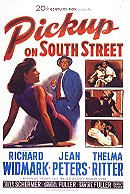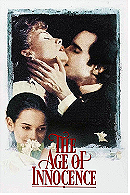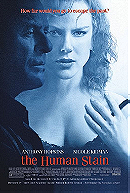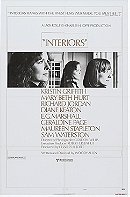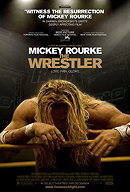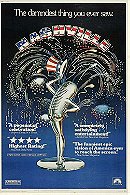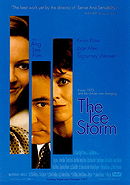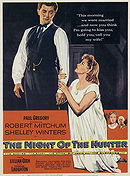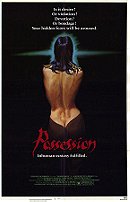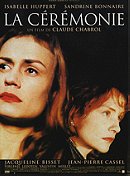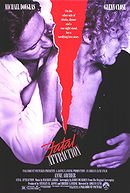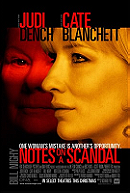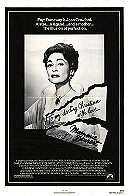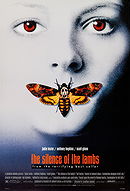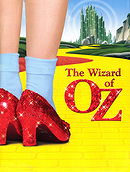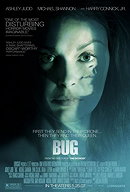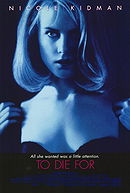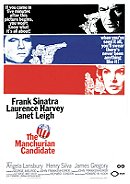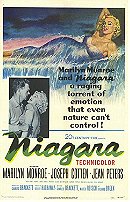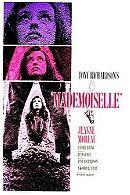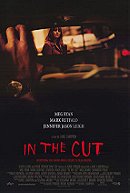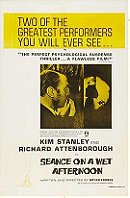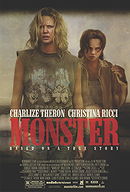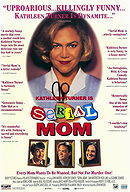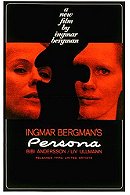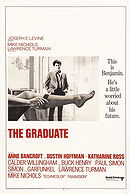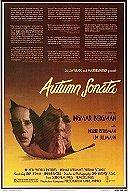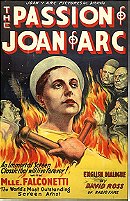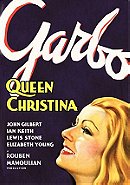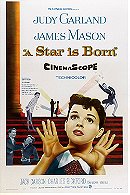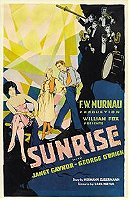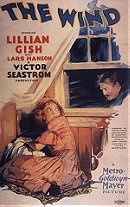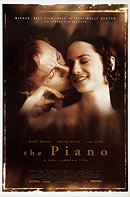100 Essential Female Film Performances
Sort by:
Showing 1-50 of 99
Decade:
Rating:
List Type:
 Add items to section
Add items to section
Life Support
These are the supporting turns that are ineradicable. Without these scene-stealers holding it all together on the sidelines, the leads of their respective films would be totally lost.
Cries and Whispers (1972)
Harriet Andersson
Harriet’s Agnes is dying an agonizing death; she is being eaten alive by an insidious cancer. She is virtually entombed in a cold red and black mansion, withering away as her sisters’ rush to the manor to nurse her during her final days. Whilst she may no longer be a physical presence in their lives, she is the catalyst for upheaval particularly for Karin and Maria. And really, Agnes is pivotal as she states in the end, “Come what may, this is happiness. I cannot wish for anything better. Now, for a few minutes, I can experience perfection. And I feel profoundly grateful to my life, which gives me so much.” It is her silent moments that hold the film together and her primal death that demands emotion drive the proceedings. Andersson provides the important centre that is strong, vulnerable, compassionate, and ultimately good that feeds the essence of Bergman’s crimson tale. KL
Harriet’s Agnes is dying an agonizing death; she is being eaten alive by an insidious cancer. She is virtually entombed in a cold red and black mansion, withering away as her sisters’ rush to the manor to nurse her during her final days. Whilst she may no longer be a physical presence in their lives, she is the catalyst for upheaval particularly for Karin and Maria. And really, Agnes is pivotal as she states in the end, “Come what may, this is happiness. I cannot wish for anything better. Now, for a few minutes, I can experience perfection. And I feel profoundly grateful to my life, which gives me so much.” It is her silent moments that hold the film together and her primal death that demands emotion drive the proceedings. Andersson provides the important centre that is strong, vulnerable, compassionate, and ultimately good that feeds the essence of Bergman’s crimson tale. KL
JxSxPx's rating:


Annette Bening
“The fine setting and workmanship usually means precious stones, but it always hurts me when I find they’re not.” This line pretty much sums up the heart of Bening’s Myra Langtry. She is a gloriously upbeat, professional sexual creature and a grifter caught up in a delicious triangle as lover to a man who is still trying to reconcile with his mother. They are all grifters and set to outdo one another. Bening is indeed a fine setting, seemingly youthful in appearance but seriously aged and damaged goods with years of experience –- she balances these polar opposites perfectly. Whilst Anjelica Huston is the wise and hardened mother figure, and John Cusack is the small time hustler desperate for love and out of his league, Bening skillfully shows the audience she must be all things to stay alive as a grifter. KL
“The fine setting and workmanship usually means precious stones, but it always hurts me when I find they’re not.” This line pretty much sums up the heart of Bening’s Myra Langtry. She is a gloriously upbeat, professional sexual creature and a grifter caught up in a delicious triangle as lover to a man who is still trying to reconcile with his mother. They are all grifters and set to outdo one another. Bening is indeed a fine setting, seemingly youthful in appearance but seriously aged and damaged goods with years of experience –- she balances these polar opposites perfectly. Whilst Anjelica Huston is the wise and hardened mother figure, and John Cusack is the small time hustler desperate for love and out of his league, Bening skillfully shows the audience she must be all things to stay alive as a grifter. KL
JxSxPx's rating:


Joan Blondell
One of my favorite things about cinema is watching the changing visage of performers from era to era, as their features change, and as the medium changes. Blondell began her career in vaudeville at age three, subsequently made it to New York to the Ziegfield Follies, and then, to Broadway. Known for her trademark wise-cracking, no-nonsense version of the “dame”, Blondell went on to appear in more than one hundred films in her career, garnering Oscar nominations and the respect of her peers who saw her as the complete supporting character actress package. In Cassavetes’ volatile film about the world of theater, Blondell was given one of most distinctive roles of her career as Sarah, the clever, unbending playwright of the show within a show that dealt with “Virginia”, a menopausal, aging woman, played by “Myrtle” in the film (that character was played by Gena Rowlands. Whew!). “If you can’t say your age, then you can’t accept my play,” the prodding Sarah snaps, in a no-nonsense manor, as dealing with the temperamental, argumentative, and alcoholic actress becomes, much to her dismay, a full-time job. The more diplomatic, though no less iron-willed Sarah must function as the glue that binds the entire production together by using her feminine wiles and her experience as a mature woman to secure Myrtle’s complete participation and allegiance to the piece, even as the actress starts cracking up and seeing ghosts. The resourceful Sarah even has a solution for supernatural problems. MM
One of my favorite things about cinema is watching the changing visage of performers from era to era, as their features change, and as the medium changes. Blondell began her career in vaudeville at age three, subsequently made it to New York to the Ziegfield Follies, and then, to Broadway. Known for her trademark wise-cracking, no-nonsense version of the “dame”, Blondell went on to appear in more than one hundred films in her career, garnering Oscar nominations and the respect of her peers who saw her as the complete supporting character actress package. In Cassavetes’ volatile film about the world of theater, Blondell was given one of most distinctive roles of her career as Sarah, the clever, unbending playwright of the show within a show that dealt with “Virginia”, a menopausal, aging woman, played by “Myrtle” in the film (that character was played by Gena Rowlands. Whew!). “If you can’t say your age, then you can’t accept my play,” the prodding Sarah snaps, in a no-nonsense manor, as dealing with the temperamental, argumentative, and alcoholic actress becomes, much to her dismay, a full-time job. The more diplomatic, though no less iron-willed Sarah must function as the glue that binds the entire production together by using her feminine wiles and her experience as a mature woman to secure Myrtle’s complete participation and allegiance to the piece, even as the actress starts cracking up and seeing ghosts. The resourceful Sarah even has a solution for supernatural problems. MM
JxSxPx's rating:


Day for Night (1973)
Valentina Cortese
The word “diva” has become synonymous with bad behavior, so calling Cortese’s masterful turn as international star Severine in Truffaut’s brilliant dissection of how a film is made is maybe not fair by such modern standards. But in playing a dipsomaniacal acting legend who can’t remember her lines to save her life, the director gives Cortese a plum chance to riff, in English, Italian and French, on aging and how it affects actresses, as well as the fragility and insecurity that come along with being a “diva”. Cortese, in her meaty, galvanizing scenes, plays comedy, rue, and hysterics with the precision of a surgeon, often times simultaneously. The actress was the heavy favorite to win the Oscar when she was nominated for her work in 74 but lost to a thrice-winning Ingrid Bergman (for in Murder on the Orient Express). So moved was Bergman by her compatriot’s performance as Severine, that from the stage as she accepted her award, she could only say “Valentina Cortese gave the most beautiful performance that all we actresses recognize. Here I am her rival and I don’t like it at all. Please forgive me, Valentina, I didn’t mean to.” MM
The word “diva” has become synonymous with bad behavior, so calling Cortese’s masterful turn as international star Severine in Truffaut’s brilliant dissection of how a film is made is maybe not fair by such modern standards. But in playing a dipsomaniacal acting legend who can’t remember her lines to save her life, the director gives Cortese a plum chance to riff, in English, Italian and French, on aging and how it affects actresses, as well as the fragility and insecurity that come along with being a “diva”. Cortese, in her meaty, galvanizing scenes, plays comedy, rue, and hysterics with the precision of a surgeon, often times simultaneously. The actress was the heavy favorite to win the Oscar when she was nominated for her work in 74 but lost to a thrice-winning Ingrid Bergman (for in Murder on the Orient Express). So moved was Bergman by her compatriot’s performance as Severine, that from the stage as she accepted her award, she could only say “Valentina Cortese gave the most beautiful performance that all we actresses recognize. Here I am her rival and I don’t like it at all. Please forgive me, Valentina, I didn’t mean to.” MM
JxSxPx's rating:


Three on a Match (1932) (1932)
Ann Dvorak
In her frenzied performance as Vivian Revere Kirkwood, that is very ahead of its time, Dvorak (who starred in the original Scarface, among other pre-Code gems) gets to upturn the traditional concepts of motherhood and loyalty in a surprisingly shocking and raw way, playing a woman who has it all, wealth, power, a family, and all of the trimming. The problem is, she’s bored with the dream life, she craves adventure and abandon…and liquor and drugs. She finds love with a gangster who sweeps her off her feet, causing her to abandon her child and marriage to become a drunken party girl. As the material drives toward its lurid child-kidnapping denouement, Dvorak gets to be sophisticated, hysterical, and, ultimately, the embodiment of the self-sacrificing maternal archetype with a final scene that will leave viewer’s hearts racing. MM
In her frenzied performance as Vivian Revere Kirkwood, that is very ahead of its time, Dvorak (who starred in the original Scarface, among other pre-Code gems) gets to upturn the traditional concepts of motherhood and loyalty in a surprisingly shocking and raw way, playing a woman who has it all, wealth, power, a family, and all of the trimming. The problem is, she’s bored with the dream life, she craves adventure and abandon…and liquor and drugs. She finds love with a gangster who sweeps her off her feet, causing her to abandon her child and marriage to become a drunken party girl. As the material drives toward its lurid child-kidnapping denouement, Dvorak gets to be sophisticated, hysterical, and, ultimately, the embodiment of the self-sacrificing maternal archetype with a final scene that will leave viewer’s hearts racing. MM
JxSxPx's rating:


Linda Hunt
So your agent tells you about this role where you get to play a Chinese/Australian dwarf of all things; it’s probably not what an aspiring actress would have dreamt of doing, though Hunt is far from your average actress, as anyone who has seen this film can attest to. Aiding an Australian wire journalist during political turmoil in 1965 Indonesia, her pivotal supporting character, Billy Kwan, is the connection between the lead stars, Mel Gibson and Sigourney Weaver. But this role for Hunt wasn’t limited to the dependable friend; Kwan, enraptured by Sukarno as puppet-master, tries to be the ultimate manipulator himself: he tries to arrange romances for everyone, and he longs for true romance of his own. Ultimately, he fails, but the beautiful journey is displayed with such passion by Hunt, with the backdrop of political revolt and tradition adding depth and reality to her performance. This quintessential character work aptly resulted in her winning a Best Supporting Actress Oscar, one of the best wins ever in the category. KL
So your agent tells you about this role where you get to play a Chinese/Australian dwarf of all things; it’s probably not what an aspiring actress would have dreamt of doing, though Hunt is far from your average actress, as anyone who has seen this film can attest to. Aiding an Australian wire journalist during political turmoil in 1965 Indonesia, her pivotal supporting character, Billy Kwan, is the connection between the lead stars, Mel Gibson and Sigourney Weaver. But this role for Hunt wasn’t limited to the dependable friend; Kwan, enraptured by Sukarno as puppet-master, tries to be the ultimate manipulator himself: he tries to arrange romances for everyone, and he longs for true romance of his own. Ultimately, he fails, but the beautiful journey is displayed with such passion by Hunt, with the backdrop of political revolt and tradition adding depth and reality to her performance. This quintessential character work aptly resulted in her winning a Best Supporting Actress Oscar, one of the best wins ever in the category. KL
JxSxPx's rating:


Anjelica Huston
“You both knew me when I was alive,” wisecracks Huston’s Nazi death camp survivor to her husband and his new wife (who happens to be her former maid), upon her reemergence into the States after being missing for years. Her character hides under this armor of wit to mask the horror that she faced in the concentration camps, as many survivors have been documented as doing to cope. Mixing humor with the Holocaust, the actress has to walk a very fine line between being a comedienne and a tragedienne, but the always-skillful daughter of director John is in possession of such a fine-tuned instrument that she can, in the span of seconds, wryly crack you up and then turn around and bring you to tears. MM
“You both knew me when I was alive,” wisecracks Huston’s Nazi death camp survivor to her husband and his new wife (who happens to be her former maid), upon her reemergence into the States after being missing for years. Her character hides under this armor of wit to mask the horror that she faced in the concentration camps, as many survivors have been documented as doing to cope. Mixing humor with the Holocaust, the actress has to walk a very fine line between being a comedienne and a tragedienne, but the always-skillful daughter of director John is in possession of such a fine-tuned instrument that she can, in the span of seconds, wryly crack you up and then turn around and bring you to tears. MM
JxSxPx's rating:


Lisa Kudrow
Kudrow casts aside her airhead antics which brought her into fame on the series Friends and opts to play Lucia with an edge of severity that most spinster types sorely lack. Luckily, her innate talent as a comedienne makes this decision just as hilarious as when she expertly plays it dumb. Lucia is far from clueless; in fact, she is on to everyone and is a kind of busy-bodied snoop. She proclaims to want to help, but often times, she is just in the way. In many ways, she mirrors the lead character drawn by Christina Ricci except she turns her sharp criticisms mostly towards herself. We laugh at Lucia and anticipate what she will say or do next but also, remarkably, relate to her due to Kudrow’s decision to play it real. TD
Kudrow casts aside her airhead antics which brought her into fame on the series Friends and opts to play Lucia with an edge of severity that most spinster types sorely lack. Luckily, her innate talent as a comedienne makes this decision just as hilarious as when she expertly plays it dumb. Lucia is far from clueless; in fact, she is on to everyone and is a kind of busy-bodied snoop. She proclaims to want to help, but often times, she is just in the way. In many ways, she mirrors the lead character drawn by Christina Ricci except she turns her sharp criticisms mostly towards herself. We laugh at Lucia and anticipate what she will say or do next but also, remarkably, relate to her due to Kudrow’s decision to play it real. TD
JxSxPx's rating:


Debbi Morgan
Midway through the picture, Morgan, playing Aunt Mozelle Batiste Delacroix (a white magic voodoo priestess), reaches a sort of transcendence as an actress as she has a vision that we feel we can believe and trust in since she relays it to us in such a powerfully intoxicating way. She travels effortlessly between the world of the dead and the world of the living. As she passionately recounts her legend of being a “black widow” to her young niece, years of heartache play out on her face, and Morgan uses her vocal inflections in a magisterially sardonic way to punctuate this lesson to a young girl who is grappling with her own mysterious abilities. Tinged with the supernatural, this monologue brings to mind Tennessee Williams crossed with Alice Walker and Toni Morrison, and the scene plays well with our own preconceptions of what a psychic’s power can actually accomplish; it also shows the downside to being so gifted. Yet this scene is almost too beautiful to watch because it completely exposes emotional environment Mozelle tragically inhabits—she is a walking contradiction. Gifted, yes, but tortured. TD
Midway through the picture, Morgan, playing Aunt Mozelle Batiste Delacroix (a white magic voodoo priestess), reaches a sort of transcendence as an actress as she has a vision that we feel we can believe and trust in since she relays it to us in such a powerfully intoxicating way. She travels effortlessly between the world of the dead and the world of the living. As she passionately recounts her legend of being a “black widow” to her young niece, years of heartache play out on her face, and Morgan uses her vocal inflections in a magisterially sardonic way to punctuate this lesson to a young girl who is grappling with her own mysterious abilities. Tinged with the supernatural, this monologue brings to mind Tennessee Williams crossed with Alice Walker and Toni Morrison, and the scene plays well with our own preconceptions of what a psychic’s power can actually accomplish; it also shows the downside to being so gifted. Yet this scene is almost too beautiful to watch because it completely exposes emotional environment Mozelle tragically inhabits—she is a walking contradiction. Gifted, yes, but tortured. TD
JxSxPx's rating:


Thandie Newton
The thing that makes Newton’s role in Demme’s so tough to play is that there really was no reference point for her from which to begin constructing her title character. This was a creation that was one hundred percent original, born of an alchemy between author Toni Morrison’s words, Demme’s atmospheric direction and Newton’s imagination. As a mystery woman who rises from a primordial swamp and wreaks havoc as she seeps into the lives of freed former slaves, Newton had to play a newborn baby’s ghost trapped in a fully-grown woman’s body, a toddler, a pregnant woman, and a demon. In a role that depends on full control of her physicality, the actress showed that she was one of few women working who could not only manipulate her limbs, face and body in an appropriately ghoulish manor, but one who could also manage to cast aside her own great beauty for the sake of being true to what the author first conceived. There is no vanity in Newton’s shocking, original portrayal. MM
The thing that makes Newton’s role in Demme’s so tough to play is that there really was no reference point for her from which to begin constructing her title character. This was a creation that was one hundred percent original, born of an alchemy between author Toni Morrison’s words, Demme’s atmospheric direction and Newton’s imagination. As a mystery woman who rises from a primordial swamp and wreaks havoc as she seeps into the lives of freed former slaves, Newton had to play a newborn baby’s ghost trapped in a fully-grown woman’s body, a toddler, a pregnant woman, and a demon. In a role that depends on full control of her physicality, the actress showed that she was one of few women working who could not only manipulate her limbs, face and body in an appropriately ghoulish manor, but one who could also manage to cast aside her own great beauty for the sake of being true to what the author first conceived. There is no vanity in Newton’s shocking, original portrayal. MM
The Royal Tenenbaums (2002)
Gwyneth Paltrow
Paltrow presents cynical adopted daughter Margot Tenenbaum to us as a painfully private, preternaturally talented, and highly secretive type who hides more than her feelings in her heavy oversized fur coats. In fact, she’s so engulfed in keeping others at bay and generating her own mythology and dramatic stage plays in equal measure, she doesn’t even seem to register how she feels about her own severed finger. Wisely, Paltrow only reveals herself to troubled brother Ritchie (albeit subtly), which propels the story forward for both of the emotionally-damaged characters, and in turn shows how great of an ensemble actress and genuinely funny Paltrow really is when she is paired with a director who engages her like Anderson does here. TD
Paltrow presents cynical adopted daughter Margot Tenenbaum to us as a painfully private, preternaturally talented, and highly secretive type who hides more than her feelings in her heavy oversized fur coats. In fact, she’s so engulfed in keeping others at bay and generating her own mythology and dramatic stage plays in equal measure, she doesn’t even seem to register how she feels about her own severed finger. Wisely, Paltrow only reveals herself to troubled brother Ritchie (albeit subtly), which propels the story forward for both of the emotionally-damaged characters, and in turn shows how great of an ensemble actress and genuinely funny Paltrow really is when she is paired with a director who engages her like Anderson does here. TD
JxSxPx's rating:


Pickup on South Street (1953)
Thelma Ritter
Ritter was so potent a performer that one feels reluctant to describe her as a “supporting” actress in spite of the six Academy Award nominations that back her up. Nevertheless, she arguably remains one of the most essential secondary players in film history, and Fuller’s brash Cold War-era noir exemplifies her immeasurable talents at their most gut-wrenching. The character traits that one associates with the actress are on full display here; the wisecracking scene-stealer with affectionately-barbed line delivery dominates her early scenes with her coarse charm. As the film progresses, the actress gingerly cuts to the frangible core behind the brassy persona and in turn exposes the world-weary humility that punctuates her film’s emotional subtext. Her expressive face and increasingly slouched posture partake in a damning indictment of social ignorance, and when the performance culminates in her brief but revelatory final scene, Ritter might well have created the most harrowing critique of the American Dream in all of cinema. SB
Ritter was so potent a performer that one feels reluctant to describe her as a “supporting” actress in spite of the six Academy Award nominations that back her up. Nevertheless, she arguably remains one of the most essential secondary players in film history, and Fuller’s brash Cold War-era noir exemplifies her immeasurable talents at their most gut-wrenching. The character traits that one associates with the actress are on full display here; the wisecracking scene-stealer with affectionately-barbed line delivery dominates her early scenes with her coarse charm. As the film progresses, the actress gingerly cuts to the frangible core behind the brassy persona and in turn exposes the world-weary humility that punctuates her film’s emotional subtext. Her expressive face and increasingly slouched posture partake in a damning indictment of social ignorance, and when the performance culminates in her brief but revelatory final scene, Ritter might well have created the most harrowing critique of the American Dream in all of cinema. SB
JxSxPx's rating:


Winona Ryder
Winona’s May hoodwinked all of us: The audience, Newland Archer, the Countess. Everybody. May Welland, a picture of a bygone, pristine society that Scorsese wrapped in white and floral compositions, pretty much always knew what was going on, maybe not exactly, but she was a picture of woman’s intuition in a time where such a thing was not talked about. She knew when her man wasn’t responding to her like he ordinarily would. In slight glances, a tilt of the head and sometimes silence, you could glean an insight as to what was going on inside her mind. Her position as Newland’s wife was utilized in the only way cunning women know how, as an all-controlling position of power, putting the enemy in retreat. And all without raising her voice or creating a scene or breaking into hysterics. May is a subtle, intelligent characterization by Ryder that makes her absence in contemporary film all the more depressing. At least with Scorsese, opposite Michelle Pfeiffer and Daniel Day Lewis, we get a sense of Ryder’s depth and seriousness, as well as her steely reserve. Scorsese’s eye for casting is generally impeccable, and this is one of his strongest intuitive choices in that respect. KL
Winona’s May hoodwinked all of us: The audience, Newland Archer, the Countess. Everybody. May Welland, a picture of a bygone, pristine society that Scorsese wrapped in white and floral compositions, pretty much always knew what was going on, maybe not exactly, but she was a picture of woman’s intuition in a time where such a thing was not talked about. She knew when her man wasn’t responding to her like he ordinarily would. In slight glances, a tilt of the head and sometimes silence, you could glean an insight as to what was going on inside her mind. Her position as Newland’s wife was utilized in the only way cunning women know how, as an all-controlling position of power, putting the enemy in retreat. And all without raising her voice or creating a scene or breaking into hysterics. May is a subtle, intelligent characterization by Ryder that makes her absence in contemporary film all the more depressing. At least with Scorsese, opposite Michelle Pfeiffer and Daniel Day Lewis, we get a sense of Ryder’s depth and seriousness, as well as her steely reserve. Scorsese’s eye for casting is generally impeccable, and this is one of his strongest intuitive choices in that respect. KL
JxSxPx's rating:


The Human Stain (2003)
Anna Deavere Smith
Smith, a commanding stage actress, NYU professor, and global health care advocate, did something amazing in this misfire of a film: she created a character that had never been seen before onscreen. A woman, a nurse, and someone challenging the preconceptions about women of color in a time where it was dangerous to be anything other than black or white, Smith’s gloriously expressive face has not been used to better effect on film. Navigating the tricky waters of skin color politics, a topic that is rarely discussed in modern film (outside of Spike Lee), the actress makes an indelible impression as the mother of a very light-skinned black man who wants to denounce his family because they are too black and he would prefer to be white. “Funny, I never thought of you as black or white,” she laments to her son, in the film’s most powerful scene. “Gold. You were my golden child.” With one sentence, and one controlled glance, the realization that her son is about to abandon her hits both the character and the audience like a train derailing. As Smith predicts her future out loud and castigates her son’s life-altering choices, her gravitas and presence take center stage and the power behind her eyes could illuminate a large city for weeks. Scenes like this leave the audience wondering why such a powerful woman isn’t given more substantial film work, though her recent turn in Jonathan Demme’s Rachel Getting Married is a step in the right direction. MM
Smith, a commanding stage actress, NYU professor, and global health care advocate, did something amazing in this misfire of a film: she created a character that had never been seen before onscreen. A woman, a nurse, and someone challenging the preconceptions about women of color in a time where it was dangerous to be anything other than black or white, Smith’s gloriously expressive face has not been used to better effect on film. Navigating the tricky waters of skin color politics, a topic that is rarely discussed in modern film (outside of Spike Lee), the actress makes an indelible impression as the mother of a very light-skinned black man who wants to denounce his family because they are too black and he would prefer to be white. “Funny, I never thought of you as black or white,” she laments to her son, in the film’s most powerful scene. “Gold. You were my golden child.” With one sentence, and one controlled glance, the realization that her son is about to abandon her hits both the character and the audience like a train derailing. As Smith predicts her future out loud and castigates her son’s life-altering choices, her gravitas and presence take center stage and the power behind her eyes could illuminate a large city for weeks. Scenes like this leave the audience wondering why such a powerful woman isn’t given more substantial film work, though her recent turn in Jonathan Demme’s Rachel Getting Married is a step in the right direction. MM
JxSxPx's rating:


Interiors (1978)
Maureen Stapleton
In a film that washes its mood in a sea of dour, static gray, Stapleton’s vibrant lady of the world Pearl stands out like a bright red buoy on a hopeful horizon, beckoning her new fiancée’s family to come into her safe harbor after a life of drifting out at sea. If you’ve seen the film, and are familiar with Allen’s generally more exuberant and warm oeuvre, this use of color could be seen as a wholly intentional homage to his hero, director Ingmar Bergman, right down to the wrenching, dramatic close-ups. Pearl may not be able to fit in with the intellectuals, who populate this desolate beach-front home, but she does not judge them and it’s her good nature, her humor and her grace that light up the film in its bleakest moments. Though her time on screen is, by today’s standards, brief—she feels complete to us. The actress fills in the blanks beautifully. We believe in her travels and want to hear more of her stories. Stapleton did an excellent job of really living in the character and engaging the audience, becoming a bright spot in a heavy film. And it’s ultimately ironic since, by default, her character, ‘the mistress’, is supposed to be the one you hate –- which is impossible to do when someone so likable and personable is playing her. TD
In a film that washes its mood in a sea of dour, static gray, Stapleton’s vibrant lady of the world Pearl stands out like a bright red buoy on a hopeful horizon, beckoning her new fiancée’s family to come into her safe harbor after a life of drifting out at sea. If you’ve seen the film, and are familiar with Allen’s generally more exuberant and warm oeuvre, this use of color could be seen as a wholly intentional homage to his hero, director Ingmar Bergman, right down to the wrenching, dramatic close-ups. Pearl may not be able to fit in with the intellectuals, who populate this desolate beach-front home, but she does not judge them and it’s her good nature, her humor and her grace that light up the film in its bleakest moments. Though her time on screen is, by today’s standards, brief—she feels complete to us. The actress fills in the blanks beautifully. We believe in her travels and want to hear more of her stories. Stapleton did an excellent job of really living in the character and engaging the audience, becoming a bright spot in a heavy film. And it’s ultimately ironic since, by default, her character, ‘the mistress’, is supposed to be the one you hate –- which is impossible to do when someone so likable and personable is playing her. TD
JxSxPx's rating:


Winter Light (1963)
Ingrid Thulin
Bergman once said: “The human face is the great subject of the cinema. Everything is there.” The Swedish master proved his theory most emphatically with Märta, Ingrid Thulin’s dowdy schoolmarm from Winter Light. After spending much of the film wallowing in a prototypical concept of female abnegation, Thulin becomes the recipient of one of Bergman’s boldest stylistic decisions: in an almost unbroken eight-minute close-up, he directs his camera’s gaze unto her seemingly unremarkable face and leaves it there. But Thulin glares right back, and in shattering the fourth wall she escapes her character’s façade to confront the audience with the repressed soul of her subservient heroine. For those eight minutes, the vulnerabilities and insecurities of a wounded heart flicker palpably across the glint of her eyes and the contours of her face—and although Märta may be a “supporting” character, with Thulin’s tender exposition of her stifled femininity she simultaneously becomes the very “winter light” of the film’s title. SB
Bergman once said: “The human face is the great subject of the cinema. Everything is there.” The Swedish master proved his theory most emphatically with Märta, Ingrid Thulin’s dowdy schoolmarm from Winter Light. After spending much of the film wallowing in a prototypical concept of female abnegation, Thulin becomes the recipient of one of Bergman’s boldest stylistic decisions: in an almost unbroken eight-minute close-up, he directs his camera’s gaze unto her seemingly unremarkable face and leaves it there. But Thulin glares right back, and in shattering the fourth wall she escapes her character’s façade to confront the audience with the repressed soul of her subservient heroine. For those eight minutes, the vulnerabilities and insecurities of a wounded heart flicker palpably across the glint of her eyes and the contours of her face—and although Märta may be a “supporting” character, with Thulin’s tender exposition of her stifled femininity she simultaneously becomes the very “winter light” of the film’s title. SB
JxSxPx's rating:


The Wrestler (2008) (2009)
Marisa Tomei
Tomei won the Oscar in 1993 for My Cousin Vinny, a charming, comedic performance if there ever was one. Then everybody had their knives sharpened for her afterwards. Many cried ‘foul!’, but she has since gone on to do some of the most solid, interesting supporting work of any actress of her generation: Unhook the Stars, Before the Devil Knows You’re Dead, and her Academy Award-nominated dramatic turn in In the Bedroom all highlight her versatility. All of these roles considered, it is her part as single mom/stripper Cassidy in this season’s The Wrestler (directed by Darren Aronofsky) that (finally!) fully utilizes all of her acting talents properly and has brought her a third nomination, and, potentially, a second win—there are moments of sly comedy, yes, but her working class Jersey girl with a big dream of having a condo and providing stability for her son is rife with pathos. She proves here, body and soul (heavy on the “body”—Tomei has also been, lately, at the deliriously sexy age of 44, doffing her clothes onscreen), that she is not a fluke Oscar winner, nor an actress who can be pigeonholed into different types, though her strength when playing scrappy working class dames is becoming a signature. Cassidy is a risqué part that could have been a throw-a-way in the hands of a lesser talented performer, but Tomei lends her charm, her gravitas, and her naked ambition (as well as her body) to the cause, making for one of this year’s finest, most exciting female performances, and cementing her as a consummate supporting actress, once and for all. MM
Tomei won the Oscar in 1993 for My Cousin Vinny, a charming, comedic performance if there ever was one. Then everybody had their knives sharpened for her afterwards. Many cried ‘foul!’, but she has since gone on to do some of the most solid, interesting supporting work of any actress of her generation: Unhook the Stars, Before the Devil Knows You’re Dead, and her Academy Award-nominated dramatic turn in In the Bedroom all highlight her versatility. All of these roles considered, it is her part as single mom/stripper Cassidy in this season’s The Wrestler (directed by Darren Aronofsky) that (finally!) fully utilizes all of her acting talents properly and has brought her a third nomination, and, potentially, a second win—there are moments of sly comedy, yes, but her working class Jersey girl with a big dream of having a condo and providing stability for her son is rife with pathos. She proves here, body and soul (heavy on the “body”—Tomei has also been, lately, at the deliriously sexy age of 44, doffing her clothes onscreen), that she is not a fluke Oscar winner, nor an actress who can be pigeonholed into different types, though her strength when playing scrappy working class dames is becoming a signature. Cassidy is a risqué part that could have been a throw-a-way in the hands of a lesser talented performer, but Tomei lends her charm, her gravitas, and her naked ambition (as well as her body) to the cause, making for one of this year’s finest, most exciting female performances, and cementing her as a consummate supporting actress, once and for all. MM
JxSxPx's rating:


Nashville (1975)
Lily Tomlin
When I think of Tomlin, I tend to think of the comedic genius she has come to be known for, as most cinema enthusiasts likely do. It was the straight-woman role of Linnea, in maverick director Altman’s Nashville, that brought the versatile performer her lone Oscar nomination. Alternately mysterious, warm, and filled with vim and vigor, Linnea is a gospel singer who is busy taking care of business (and her family) at the flashpoint of the titular city’s impending nervous breakdown, making her own money, fielding a whole heap of lies from her philandering hubby, and being a perfect mother to her two hearing-impaired children (complete with scenes of sign language -– which the actress learned for the part). It is the kind of singular, quirky supporting character that can only happen, without mockery, in an Altman film. The real shading comes when a visiting folk singer becomes sexually obsessed with her and Linnea’s adventures in Nashville really begin. MM
When I think of Tomlin, I tend to think of the comedic genius she has come to be known for, as most cinema enthusiasts likely do. It was the straight-woman role of Linnea, in maverick director Altman’s Nashville, that brought the versatile performer her lone Oscar nomination. Alternately mysterious, warm, and filled with vim and vigor, Linnea is a gospel singer who is busy taking care of business (and her family) at the flashpoint of the titular city’s impending nervous breakdown, making her own money, fielding a whole heap of lies from her philandering hubby, and being a perfect mother to her two hearing-impaired children (complete with scenes of sign language -– which the actress learned for the part). It is the kind of singular, quirky supporting character that can only happen, without mockery, in an Altman film. The real shading comes when a visiting folk singer becomes sexually obsessed with her and Linnea’s adventures in Nashville really begin. MM
JxSxPx's rating:


The Ice Storm (1997)
Sigourney Weaver
Janey Carver is a would-be normal housewife frozen in a fantasy of herself as the neighborhood femme fatale. While we see her pose in revealing outfits fit for the actresses of a great noir, one can’t help but notice her grave disappointment in knowing its just dress up. How sad it must be to not only be bored by your marriage but also irritated by your equally lackluster affair. What she actually feels, Weaver keeps it to herself. Not because she has to, but because she wants to. And it’s this level of empowerment over her situation that keeps the men coming back for more. A scene that may be ordinarily catty reads in such a different way at the level Weaver plays it. She grabs a set of keys in a fishbowl. Her not-so-secret lover wants her to grab his. She intentionally selects another pair but the flick in her wrist and the way she curls the keys up to her hand speaks a thousand words. She is completely aware that she is perpetually trapped in a limbo of cheap, unnecessary thrills and she’s as equally aware that they will never notice. TD
Janey Carver is a would-be normal housewife frozen in a fantasy of herself as the neighborhood femme fatale. While we see her pose in revealing outfits fit for the actresses of a great noir, one can’t help but notice her grave disappointment in knowing its just dress up. How sad it must be to not only be bored by your marriage but also irritated by your equally lackluster affair. What she actually feels, Weaver keeps it to herself. Not because she has to, but because she wants to. And it’s this level of empowerment over her situation that keeps the men coming back for more. A scene that may be ordinarily catty reads in such a different way at the level Weaver plays it. She grabs a set of keys in a fishbowl. Her not-so-secret lover wants her to grab his. She intentionally selects another pair but the flick in her wrist and the way she curls the keys up to her hand speaks a thousand words. She is completely aware that she is perpetually trapped in a limbo of cheap, unnecessary thrills and she’s as equally aware that they will never notice. TD
The Night of the Hunter (1955)
Shelley Winters
“It’s love that won,” coos the starry-eyed Willa Harper in reference to her new beau Harry Powell (the menacing Robert Mitchum), and from there and then, she was doomed. After losing her criminal husband, and left with two children to raise during the Depression, Harper felt societal pressured to marry again right away, but also desperately wanted to—marriage wasn’t just a necessity in the ‘30s, but a desire for women of the time. Enter Harry—a psychopathic preacher who is only interested in money and will got to whatever lengths to get it: such as marrying the desperate mother of two whose husband hid a small fortune that Harry believes her young son is privy to. Oh, and he hates women, to boot. One unforgettable scene is Willa’s wedding night with Harry. He is lying in bed, motionless and distant. She looks out the window, looks over to her new husband and desires connection and love but there will be none of that. She is made to stand in front of the mirror and learn what her place is in the world—she is powerless. Winters in that one scene, gives us the lot—she is lost, naive and desires to be protected and loved again, but is made to tragically understand what a woman’s place is, as far as Harry’s concerned—at the bottom of a river. KL
“It’s love that won,” coos the starry-eyed Willa Harper in reference to her new beau Harry Powell (the menacing Robert Mitchum), and from there and then, she was doomed. After losing her criminal husband, and left with two children to raise during the Depression, Harper felt societal pressured to marry again right away, but also desperately wanted to—marriage wasn’t just a necessity in the ‘30s, but a desire for women of the time. Enter Harry—a psychopathic preacher who is only interested in money and will got to whatever lengths to get it: such as marrying the desperate mother of two whose husband hid a small fortune that Harry believes her young son is privy to. Oh, and he hates women, to boot. One unforgettable scene is Willa’s wedding night with Harry. He is lying in bed, motionless and distant. She looks out the window, looks over to her new husband and desires connection and love but there will be none of that. She is made to stand in front of the mirror and learn what her place is in the world—she is powerless. Winters in that one scene, gives us the lot—she is lost, naive and desires to be protected and loved again, but is made to tragically understand what a woman’s place is, as far as Harry’s concerned—at the bottom of a river. KL
JxSxPx's rating:


 Add items to section
Add items to section
The Dark Side
These are the women who confronted, made, or actually were monsters in one way or another. Some are villainesses, others were just born bad, some still are just misunderstood or a little disturbed, but each actress listed here intrepidly confronts some form of evil.
Isabelle Adjani
When it comes to describing great film acting, “fearless” is perhaps the most overused word in the critic’s handbook. Watching Adjani in Possession however, is to witness it being defined on-screen. The actress’s vampire-like beauty harbors an electrifying mélange of mesmerizing physicality, intransigent masochism and unbridled eroticism. Her meager frame both expunges and is penetrated by the most inconceivable of grotesqueries, whilst remaining grounded in the authenticity of maternal longing and misplaced desire. And during the film’s morbidly engrossing set piece, she literally throws herself around the frame whilst releasing blood-curdling screams of terror as she enacts the so-called “possession”. It’s a scene, not to mention a performance, which threatens to veer hopelessly into exploitative camp. With the ferocity of Adjani’s conviction however, Possession morphs into a spiritually-disfigured ballet of female angst and suffering, suspended in time and irrevocable from the memory. SB
The single thing I want most in life right now is to talk to Adjani about how that “possession” scene was made and what she did in preparation for it. I don’t think I’ve ever seen such an experimental, unnerving thing as that onscreen. The sustained, unreal state of hysteria she had to inhabit throughout the film demands an actress with equally unreal stamina and beauty, and Adjani fits all of the role’s requirements perfectly. She deservedly won Best Actress at Cannes for this. MM
When it comes to describing great film acting, “fearless” is perhaps the most overused word in the critic’s handbook. Watching Adjani in Possession however, is to witness it being defined on-screen. The actress’s vampire-like beauty harbors an electrifying mélange of mesmerizing physicality, intransigent masochism and unbridled eroticism. Her meager frame both expunges and is penetrated by the most inconceivable of grotesqueries, whilst remaining grounded in the authenticity of maternal longing and misplaced desire. And during the film’s morbidly engrossing set piece, she literally throws herself around the frame whilst releasing blood-curdling screams of terror as she enacts the so-called “possession”. It’s a scene, not to mention a performance, which threatens to veer hopelessly into exploitative camp. With the ferocity of Adjani’s conviction however, Possession morphs into a spiritually-disfigured ballet of female angst and suffering, suspended in time and irrevocable from the memory. SB
The single thing I want most in life right now is to talk to Adjani about how that “possession” scene was made and what she did in preparation for it. I don’t think I’ve ever seen such an experimental, unnerving thing as that onscreen. The sustained, unreal state of hysteria she had to inhabit throughout the film demands an actress with equally unreal stamina and beauty, and Adjani fits all of the role’s requirements perfectly. She deservedly won Best Actress at Cannes for this. MM
JxSxPx's rating:


La Cérémonie (1995)
Sandrine Bonnaire
In Chabrol’s undervalued, mysterious thriller, Bonnaire made a strong impression as Sophie, the dyslexic maid of a well-to-do family who calmly, coolly, cracks apart under the pressure of working for her imperious bosses. Along with her partner in crime, the devious postal employee Jeanne (Isabelle Huppert, in top form, as usual), Sophie begins exacting her “revenge” with slight little bits of mischief directed towards the family that eventually turn into something much scarier and more substantial. The things separating the somewhat tawdry material from becoming just another “woman-as-killer” flick are the steady-handed direction of Chabrol, who turns the screws very tightly; the gorgeous original score from Matthieu Chabrol; and the chemistry between the two leading ladies. Bonnaire, though, in particular, as the wispy Sophie, lends great humanity and depth to the shocking spiral of domestic violence that happens at an achingly slow crawl. Everything she needs to express in this film, she does it using her face and through subtly of gesture; the construction of Sophie’s fragile psyche is accomplished on the cellular level. As she so equally (and successfully) disappeared in Agnes Varda’s Vagabond, the actress nailed every nuance of this sordid drifter’s downfall, playing her as a rogue maid who has a eerily quiet psychotic break encouraged each step of the way by her diabolical gal pal. MM
In Chabrol’s undervalued, mysterious thriller, Bonnaire made a strong impression as Sophie, the dyslexic maid of a well-to-do family who calmly, coolly, cracks apart under the pressure of working for her imperious bosses. Along with her partner in crime, the devious postal employee Jeanne (Isabelle Huppert, in top form, as usual), Sophie begins exacting her “revenge” with slight little bits of mischief directed towards the family that eventually turn into something much scarier and more substantial. The things separating the somewhat tawdry material from becoming just another “woman-as-killer” flick are the steady-handed direction of Chabrol, who turns the screws very tightly; the gorgeous original score from Matthieu Chabrol; and the chemistry between the two leading ladies. Bonnaire, though, in particular, as the wispy Sophie, lends great humanity and depth to the shocking spiral of domestic violence that happens at an achingly slow crawl. Everything she needs to express in this film, she does it using her face and through subtly of gesture; the construction of Sophie’s fragile psyche is accomplished on the cellular level. As she so equally (and successfully) disappeared in Agnes Varda’s Vagabond, the actress nailed every nuance of this sordid drifter’s downfall, playing her as a rogue maid who has a eerily quiet psychotic break encouraged each step of the way by her diabolical gal pal. MM
Fatal Attraction (1987)
Glenn Close
As skilled as a performer as we realize Close to be, she allowed her portrayal of Alex Forrest to be feathered by a dangerous stroke of spontaneity. Words like “instinct” and “impulse” come to mind when thinking about this performance. It’s no different than an actress undergoing a physical transformation to look right for a part, only Close works conversely from the inside out. She brought a realistic approach to a potentially misogynist vision and fought tooth and nail for the artistic integrity of her creation when the studio insisted on going back and re-shooting the film’s ending. Her take on how a woman in this situation would not only behave, but also construct sentences and be aware of the smallest details –- down to how she held her purse to her side, gave Alex the necessary humanity she was missing on the page. Even though we do not see her crime in the infamous bunny scene—we can imagine her doing it since she made Forrest’s traits and progression into mental illness so three- dimensional. It’s a tremendously realized characterization which only made her crimes all the more terrifying and almost understandable. TD
As skilled as a performer as we realize Close to be, she allowed her portrayal of Alex Forrest to be feathered by a dangerous stroke of spontaneity. Words like “instinct” and “impulse” come to mind when thinking about this performance. It’s no different than an actress undergoing a physical transformation to look right for a part, only Close works conversely from the inside out. She brought a realistic approach to a potentially misogynist vision and fought tooth and nail for the artistic integrity of her creation when the studio insisted on going back and re-shooting the film’s ending. Her take on how a woman in this situation would not only behave, but also construct sentences and be aware of the smallest details –- down to how she held her purse to her side, gave Alex the necessary humanity she was missing on the page. Even though we do not see her crime in the infamous bunny scene—we can imagine her doing it since she made Forrest’s traits and progression into mental illness so three- dimensional. It’s a tremendously realized characterization which only made her crimes all the more terrifying and almost understandable. TD
JxSxPx's rating:


Notes on a Scandal (2006)
Judi Dench
At age 72, Dench reinvented herself as obsessive lesbian stalker Barbara Covett in this gripping study of two very desperate women (the other is Cate Blanchett’s Sheba Hart) who have nowhere to turn except to one another. Barbara is an institution at her school, students fear her, and the other teachers hate her. She is a mouthy loner that is just unpleasant in general to everyone. She finds everyone dull or stupid except Sheba, who (unfortunately for her), brushes the cobwebs from Barbara’s eyes and virtually illuminates her face and thoughts with her presence alone. Once Barbara sets her sites on a special friendship with a certain young (targeted) lady, things can get a tad nasty, a tad tawdry, even. Couple this obsessive love with the fact that Barbara has, coincidentally, stumbled by accident onto some choice evidence to use in bribing Sheba to be her companion. Filled with one-liners you will use for the rest of your life (“you’re not young, sneers Barbara in one scene), Eyre’s depiction of sexually threatening, corpulent evil lurking in the most unseemly of places, like in the person of sweet little Dame Judi Dench, is a nail-biter. The veteran actress goes for broke in a way that hasn’t been seen since Beryl Reid chortled and smoked her way through The Killing of Sister George 40 years ago. Only here Dench brings an unquestionable theatrical pedigree along with her to quiet any detractors that dismiss this as camp trash. MM
At age 72, Dench reinvented herself as obsessive lesbian stalker Barbara Covett in this gripping study of two very desperate women (the other is Cate Blanchett’s Sheba Hart) who have nowhere to turn except to one another. Barbara is an institution at her school, students fear her, and the other teachers hate her. She is a mouthy loner that is just unpleasant in general to everyone. She finds everyone dull or stupid except Sheba, who (unfortunately for her), brushes the cobwebs from Barbara’s eyes and virtually illuminates her face and thoughts with her presence alone. Once Barbara sets her sites on a special friendship with a certain young (targeted) lady, things can get a tad nasty, a tad tawdry, even. Couple this obsessive love with the fact that Barbara has, coincidentally, stumbled by accident onto some choice evidence to use in bribing Sheba to be her companion. Filled with one-liners you will use for the rest of your life (“you’re not young, sneers Barbara in one scene), Eyre’s depiction of sexually threatening, corpulent evil lurking in the most unseemly of places, like in the person of sweet little Dame Judi Dench, is a nail-biter. The veteran actress goes for broke in a way that hasn’t been seen since Beryl Reid chortled and smoked her way through The Killing of Sister George 40 years ago. Only here Dench brings an unquestionable theatrical pedigree along with her to quiet any detractors that dismiss this as camp trash. MM
JxSxPx's rating:


Mommie Dearest (1981)
Faye Dunaway
In a performance that encompasses the traditional, expressive styles of the Kabuki, Noh, and classical Greek forms of theater, Dunaway positively attacks this part and devours it from the second she emerges onscreen as legend Joan Crawford. Whether or not this is how Crawford actually was isn’t really the point, nor is dismissing the stellar, deliberately-mannered work of Dunaway as simple caricature: underneath the wigs, immensely shoulder-padded costumes, and the garish “Old Hollywood” make-up job (complete with gigantic, crazy Crawford eyebrows!), there is a brilliantly-organized, fearlessly physical tour de force. Dunaway is committed in an almost eerie way to this character, as though she is channeling a malevolent ghost. Playing someone who is constantly giving a performance can’t be an easy feat, but giving a thinly-drawn sketch or an impervious legend a semblance of a heart, as well as making her an all-time classically iconic villainess, is a pure victory for Dunaway, who made this sort of magic time and again with other similarly iconic parts in Bonnie and Clyde, Chinatown and her Oscar-winning Network. She took these prototypes and fleshed them all out, Mommie being her most brave, most inventive, and certainly most chillingly scary. MM
In a performance that encompasses the traditional, expressive styles of the Kabuki, Noh, and classical Greek forms of theater, Dunaway positively attacks this part and devours it from the second she emerges onscreen as legend Joan Crawford. Whether or not this is how Crawford actually was isn’t really the point, nor is dismissing the stellar, deliberately-mannered work of Dunaway as simple caricature: underneath the wigs, immensely shoulder-padded costumes, and the garish “Old Hollywood” make-up job (complete with gigantic, crazy Crawford eyebrows!), there is a brilliantly-organized, fearlessly physical tour de force. Dunaway is committed in an almost eerie way to this character, as though she is channeling a malevolent ghost. Playing someone who is constantly giving a performance can’t be an easy feat, but giving a thinly-drawn sketch or an impervious legend a semblance of a heart, as well as making her an all-time classically iconic villainess, is a pure victory for Dunaway, who made this sort of magic time and again with other similarly iconic parts in Bonnie and Clyde, Chinatown and her Oscar-winning Network. She took these prototypes and fleshed them all out, Mommie being her most brave, most inventive, and certainly most chillingly scary. MM
JxSxPx's rating:


Jodie Foster
I’ve always said that one of the reasons Foster was so brilliant in The Silence of the Lambs is that she played the character so thoroughly and so cerebrally that we can actually sense her subconscious. It’s needed for all of the psychological rides she endures throughout the film and the kind of psychobabble she engages in with the mythic monster Dr. Hannibal Lector. Thematically and politically complex, this is a multi-angled representation of a strong, young female character (who is not an ingénue), and the strength of Foster’s performance aligns with the film in the way she serves it with a well-played lack of self-confidence. Her ability to play Clarice so vulnerably allows the true terror of the film to set with the viewer in appropriate discomfort as she becomes a tour guide into the darkness. The fact that we can feel her trembling and rethinking, under the uniforms and self-checks, to follow her newly learned protocol, make her emotional and physical predicaments all the scarier. TD
I’ve always said that one of the reasons Foster was so brilliant in The Silence of the Lambs is that she played the character so thoroughly and so cerebrally that we can actually sense her subconscious. It’s needed for all of the psychological rides she endures throughout the film and the kind of psychobabble she engages in with the mythic monster Dr. Hannibal Lector. Thematically and politically complex, this is a multi-angled representation of a strong, young female character (who is not an ingénue), and the strength of Foster’s performance aligns with the film in the way she serves it with a well-played lack of self-confidence. Her ability to play Clarice so vulnerably allows the true terror of the film to set with the viewer in appropriate discomfort as she becomes a tour guide into the darkness. The fact that we can feel her trembling and rethinking, under the uniforms and self-checks, to follow her newly learned protocol, make her emotional and physical predicaments all the scarier. TD
JxSxPx's rating:


The Wizard of Oz (1939)
Margaret Hamilton
This is a ballsy performance, when you think about the kind of reaction it provoked, globally -– pure, unbridled terror was struck in the hearts of children all over the world with just one fiery cackle. Hamilton was so unrepentantly evil (as both Ms. Gulch and The Wicked Witch) that generations of film-goers hated her very visage for what she put Dorothy and Co. through on their trek through Oz. For a working character actress to have the fortitude to create such an indelible, unapologetic manifestation of pure evil, in a time where gentility in female characters was the standard, was utterly brave and could have possibly sunk her career. Instead, she gamely covered her face in ghastly, toxic-green make-up and screeched her way into infamy by holding one Kansas girl’s innocence hostage and terrorizing her with poppies, fire, and flying monkeys. This is an unforgettable, singularly American representation of female evil. Guard your little dogs closely. MM
This is a ballsy performance, when you think about the kind of reaction it provoked, globally -– pure, unbridled terror was struck in the hearts of children all over the world with just one fiery cackle. Hamilton was so unrepentantly evil (as both Ms. Gulch and The Wicked Witch) that generations of film-goers hated her very visage for what she put Dorothy and Co. through on their trek through Oz. For a working character actress to have the fortitude to create such an indelible, unapologetic manifestation of pure evil, in a time where gentility in female characters was the standard, was utterly brave and could have possibly sunk her career. Instead, she gamely covered her face in ghastly, toxic-green make-up and screeched her way into infamy by holding one Kansas girl’s innocence hostage and terrorizing her with poppies, fire, and flying monkeys. This is an unforgettable, singularly American representation of female evil. Guard your little dogs closely. MM
JxSxPx's rating:


Ran (1985)
Meiko Harada
In adapting King Lear, Kurosawa opted to substitute Shakespeare’s female leads for the men with whom he was always more attuned. Fortunately, the final product doesn’t dispense with femininity altogether: the collective wrath of The Bard’s discarded women finds an outlet in the vengeful figure of Lady Kaede. Her clear template is Lady Macbeth, but in the hands of Harada that example is exploded to its most embittered potential. Her initially dulcet, eloquent diction barely conceals the contempt that boils underneath. That rage eventually finds its release in Harada’s murderous shrieks, which convey a high-intensity brand of fury that’s impassioned with her steadfast familial loyalty. Most interesting of all however, are the psychosexual undercurrents that emanate from her steely stares and her otherworldly shuffles across the screen. In Ran‘s only seduction scene, Lady Kaede literally draws blood—and Harada plays the scene as if she’s turned on by it. Frankly, she’s terrifying. SB
In adapting King Lear, Kurosawa opted to substitute Shakespeare’s female leads for the men with whom he was always more attuned. Fortunately, the final product doesn’t dispense with femininity altogether: the collective wrath of The Bard’s discarded women finds an outlet in the vengeful figure of Lady Kaede. Her clear template is Lady Macbeth, but in the hands of Harada that example is exploded to its most embittered potential. Her initially dulcet, eloquent diction barely conceals the contempt that boils underneath. That rage eventually finds its release in Harada’s murderous shrieks, which convey a high-intensity brand of fury that’s impassioned with her steadfast familial loyalty. Most interesting of all however, are the psychosexual undercurrents that emanate from her steely stares and her otherworldly shuffles across the screen. In Ran‘s only seduction scene, Lady Kaede literally draws blood—and Harada plays the scene as if she’s turned on by it. Frankly, she’s terrifying. SB
JxSxPx's rating:


The Piano Teacher (2001)
Isabelle Huppert
We’re not given much of a back-story onto why Erika is the way she is. A reason, at this point in her life, wouldn’t provide the answers anyway. Least of all to her psychosexual neuroses or her bordering-on-incestuous relationship with her mother. The fact is she’s a shell of a person forever daydreaming and hating herself for it. I think the great tragedy of her character is that she does want to be loved. It’s just unfortunate she can’t find the right ways to go about finding it. Huppert is bold in playing this stilted girl in a bitter woman’s body. She goes where many actresses would be afraid to go—portraying someone truly ugly, without the make up or a fat suit. As twisted as everything that occurs onscreen is—Huppert allows us to see the person within through it all. This achieves the desired effect of shock and sickness. If she had played her as just a wicked pervert, it may not have packed such an emotional wallop. Most of the film, she’s alone onscreen, but around large groups of people. It is a testament to her skill as a performer that we don’t notice anyone else. TD
We’re not given much of a back-story onto why Erika is the way she is. A reason, at this point in her life, wouldn’t provide the answers anyway. Least of all to her psychosexual neuroses or her bordering-on-incestuous relationship with her mother. The fact is she’s a shell of a person forever daydreaming and hating herself for it. I think the great tragedy of her character is that she does want to be loved. It’s just unfortunate she can’t find the right ways to go about finding it. Huppert is bold in playing this stilted girl in a bitter woman’s body. She goes where many actresses would be afraid to go—portraying someone truly ugly, without the make up or a fat suit. As twisted as everything that occurs onscreen is—Huppert allows us to see the person within through it all. This achieves the desired effect of shock and sickness. If she had played her as just a wicked pervert, it may not have packed such an emotional wallop. Most of the film, she’s alone onscreen, but around large groups of people. It is a testament to her skill as a performer that we don’t notice anyone else. TD
Ashley Judd
Bug is a horror film. We can see this when we see Agnes accepting this wayward stranger into her home. We want to tell her to stop, just as you would encourage a girl in a scary movie not to go down the dark hallway. But, she does so anyway. In a sense, it’s not a home she’s inviting him into (only half because it’s a hotel room) but instead a frame of mind. Why does Agnes engage this man in his eccentric beliefs and conversation? She wants to get lost. She wants to inhabit anyone else’s space but her own. She had given up on that long before she even met Peter (Michael Shannon). Is there a romantic aspect to this tragedy? Would it be insane to suggest there is? I don’t know. But, I have a nagging feeling that even if she hadn’t met the fate she does meet within this film—she would have met it somehow, some way. It’s all a question of whom with. Judd is brilliant in the movie. In one long monologue, when she’s crossing over the brink, she puts the broken pieces of her life’s puzzle together and when she claims she is the super mother bug—it’s not funny or campy. It’s depressing and harrowing. Because we know she thinks it’s true and we know what this truth means to her. We no longer have any hope for a rescue or escape from whatever happens next. Instead, we’re forced to watch it all horrifically unfurl inside that scary little motel room. TD
Bug is a horror film. We can see this when we see Agnes accepting this wayward stranger into her home. We want to tell her to stop, just as you would encourage a girl in a scary movie not to go down the dark hallway. But, she does so anyway. In a sense, it’s not a home she’s inviting him into (only half because it’s a hotel room) but instead a frame of mind. Why does Agnes engage this man in his eccentric beliefs and conversation? She wants to get lost. She wants to inhabit anyone else’s space but her own. She had given up on that long before she even met Peter (Michael Shannon). Is there a romantic aspect to this tragedy? Would it be insane to suggest there is? I don’t know. But, I have a nagging feeling that even if she hadn’t met the fate she does meet within this film—she would have met it somehow, some way. It’s all a question of whom with. Judd is brilliant in the movie. In one long monologue, when she’s crossing over the brink, she puts the broken pieces of her life’s puzzle together and when she claims she is the super mother bug—it’s not funny or campy. It’s depressing and harrowing. Because we know she thinks it’s true and we know what this truth means to her. We no longer have any hope for a rescue or escape from whatever happens next. Instead, we’re forced to watch it all horrifically unfurl inside that scary little motel room. TD
JxSxPx's rating:


To Die For (1995)
Nicole Kidman
“You aren’t really anybody in America if you’re not on TV,” Kidman bubble-headedly states in this biting and satirical take on fame in America. Suzanne Stone Maretto, akin to a certain former Vice-Presidential candidate, is rich on gumption and determination but completely lacking in any real talent, unless you count whoring and manipulation as “talent”. What she does have and is fully, painfully, aware of, is siren-like beauty. This is used by her and against her throughout the course of Van Sant’s tense little lampooning of America’s obsession with the media and the spotlight. It is the classic double-edged sword faced by women, Kidman chief among them -– she has been both widely criticized for her beauty, and also roundly critiqued for hiding it. In what many see as a breakthrough performance, Kidman portrays naiveté, cunning, ambition and seduction at every turn to give us the classic image of a woman who thinks she’s in charge when really she isn’t. She is definitely one of the most clueless villainesses to appear onscreen, but that blundering, cringe-inducing stupid side of Suzanne only makes Kidman’s flawless performance all the more watchable. KL
“You aren’t really anybody in America if you’re not on TV,” Kidman bubble-headedly states in this biting and satirical take on fame in America. Suzanne Stone Maretto, akin to a certain former Vice-Presidential candidate, is rich on gumption and determination but completely lacking in any real talent, unless you count whoring and manipulation as “talent”. What she does have and is fully, painfully, aware of, is siren-like beauty. This is used by her and against her throughout the course of Van Sant’s tense little lampooning of America’s obsession with the media and the spotlight. It is the classic double-edged sword faced by women, Kidman chief among them -– she has been both widely criticized for her beauty, and also roundly critiqued for hiding it. In what many see as a breakthrough performance, Kidman portrays naiveté, cunning, ambition and seduction at every turn to give us the classic image of a woman who thinks she’s in charge when really she isn’t. She is definitely one of the most clueless villainesses to appear onscreen, but that blundering, cringe-inducing stupid side of Suzanne only makes Kidman’s flawless performance all the more watchable. KL
JxSxPx's rating:


Titus (1999)
Jessica Lange
If the steely death’s head look she gives Anthony Hopkins’ Titus Andronicus while ascending the steps of the Emperor’s palace doesn’t completely chill your blood, then surely, the wickedly confrontational aside Lange delivers straight on to the camera and the audience will: she unleashes a bloody declaration and states her fatal intention of war. Nihilistic and animalistic, Tamora Queen of the Goths wishes to have absolute revenge on the man who killed her son in a ritualistic sacrifice, no matter the cost (which turns out to be quite high in the end). The intensely dramatic monologue ends with a gleeful girlish giggle, as she turns back to her party guests, perfectly snapped back into reality after a psychotic break. For an actor to get back and forth to the place Lange goes to in this scene they must have scrupulous control over their emotions and able to stop and go on a dime, which is definitely a Lange trademark. I am beginning to think that this is not only the best scene of her career, but maybe even her best performance. I know, this borders on sacrilege for Lange fans like myself (Frances!), but the instinctual, guttural impressionism the performer engages in seems as exciting for her as it is for the audience. This is an element of acting that I appreciate very much, and I think this kind of commitment to a role is admirable, which makes perfect sense as Lange is a most admirable type of artist. MM
If the steely death’s head look she gives Anthony Hopkins’ Titus Andronicus while ascending the steps of the Emperor’s palace doesn’t completely chill your blood, then surely, the wickedly confrontational aside Lange delivers straight on to the camera and the audience will: she unleashes a bloody declaration and states her fatal intention of war. Nihilistic and animalistic, Tamora Queen of the Goths wishes to have absolute revenge on the man who killed her son in a ritualistic sacrifice, no matter the cost (which turns out to be quite high in the end). The intensely dramatic monologue ends with a gleeful girlish giggle, as she turns back to her party guests, perfectly snapped back into reality after a psychotic break. For an actor to get back and forth to the place Lange goes to in this scene they must have scrupulous control over their emotions and able to stop and go on a dime, which is definitely a Lange trademark. I am beginning to think that this is not only the best scene of her career, but maybe even her best performance. I know, this borders on sacrilege for Lange fans like myself (Frances!), but the instinctual, guttural impressionism the performer engages in seems as exciting for her as it is for the audience. This is an element of acting that I appreciate very much, and I think this kind of commitment to a role is admirable, which makes perfect sense as Lange is a most admirable type of artist. MM
JxSxPx's rating:


Angela Lansbury
Most people probably recognize Lansbury mostly as a sweet, friendly grand dame of stage and screen, for her warm work in such family institutions as Beauty and the Beast or her long-running television show Murder, She Wrote, but it is here in Frankenheimer’s surreal, nasty political thriller that she is able to shatter any preconceptions about her being a nice little old lady. As the enigmatic Mrs. Iselin (aka “Raymond’s Mother/The Queen of Hearts”), Lansbury gives viewers a peek at a singularly nasty side, one where she offers up her son, through hypnosis, to the cause of destroying the government. She will let nothing stop her from realizing her goal of getting her son’s father elected president, and if that means having her son turn into a trained-zombie assassin, than so be it! Meryl Streep tried to make this role her own in Jonathan Demme’s 2003 remake, but not even she could erase the chilling memories of Lansbury’s unrepentant hybrid of Lady Macbeth, Nancy Reagan, and Mommie Dearest. In fact, she didn’t even come close. MM
Most people probably recognize Lansbury mostly as a sweet, friendly grand dame of stage and screen, for her warm work in such family institutions as Beauty and the Beast or her long-running television show Murder, She Wrote, but it is here in Frankenheimer’s surreal, nasty political thriller that she is able to shatter any preconceptions about her being a nice little old lady. As the enigmatic Mrs. Iselin (aka “Raymond’s Mother/The Queen of Hearts”), Lansbury gives viewers a peek at a singularly nasty side, one where she offers up her son, through hypnosis, to the cause of destroying the government. She will let nothing stop her from realizing her goal of getting her son’s father elected president, and if that means having her son turn into a trained-zombie assassin, than so be it! Meryl Streep tried to make this role her own in Jonathan Demme’s 2003 remake, but not even she could erase the chilling memories of Lansbury’s unrepentant hybrid of Lady Macbeth, Nancy Reagan, and Mommie Dearest. In fact, she didn’t even come close. MM
JxSxPx's rating:


Niagara (1953)
Marilyn Monroe
I first learned about this performance from none other than musician Tori Amos. We were talking about female acting performances that inform and inspire her work during an interview and this was one that she insisted I watch, despite my not ever really warming to Monroe as an actress: “I just loved that. I hadn’t been into her, but one of my friends made me watch Niagara and I watched that and I just thought that there are a lot of young women that try and be dangerous Aphrodites, but she, in this role, was really dangerous. And she was seductive. To see how a woman can use her seduction and act as if she doesn’t have a brain in her head, but really is plotting the whole thing and is destroying people’s lives.” With that recommendation, I had to go out and at least try and see the performance through a new lens, with a different eye. You know what? Tori was right. This is much more than just an icon posturing for her disciples, this was a woman who fought for dramatically substantial parts like Rose and showing people she was more than just an image. With all of the surreally bright rainbow symbolism juxtaposed with the grittiness of Monroe’s diabolical murderess, Niagara is more than just an idol earning a paycheck, and her performance is a force of nature not unlike the film’s foreboding, omnipresent falls of the title. When Tori tells you to watch something, watch it! MM
I first learned about this performance from none other than musician Tori Amos. We were talking about female acting performances that inform and inspire her work during an interview and this was one that she insisted I watch, despite my not ever really warming to Monroe as an actress: “I just loved that. I hadn’t been into her, but one of my friends made me watch Niagara and I watched that and I just thought that there are a lot of young women that try and be dangerous Aphrodites, but she, in this role, was really dangerous. And she was seductive. To see how a woman can use her seduction and act as if she doesn’t have a brain in her head, but really is plotting the whole thing and is destroying people’s lives.” With that recommendation, I had to go out and at least try and see the performance through a new lens, with a different eye. You know what? Tori was right. This is much more than just an icon posturing for her disciples, this was a woman who fought for dramatically substantial parts like Rose and showing people she was more than just an image. With all of the surreally bright rainbow symbolism juxtaposed with the grittiness of Monroe’s diabolical murderess, Niagara is more than just an idol earning a paycheck, and her performance is a force of nature not unlike the film’s foreboding, omnipresent falls of the title. When Tori tells you to watch something, watch it! MM
JxSxPx's rating:


Mademoiselle (1966)
Jeanne Moreau
With a story credited to Jean Genet (The Thieves’ Journal) and Marguerite Duras (Hiroshima mon Amour), there was no way this couldn’t turn out to be ripe with malevolent tension. Moreau is “Mademoiselle” the prim, psychotic schoolmarm who lords over the village’s elementary school. She harasses children, she starts fires, she kills animals and she poisons the town’s water supply. This is all within the first half hour. We begin to realize that Mademoiselle’s actual motive for doing all of this is quite likely repressed lust for an Italian carpenter (and isn’t that always the case, ladies?). As she both purposefully and accidentally begins to commit murder, the length she takes to hide her culpability in the crimes takes her to new lows, such as animalistic, masochistic, rape-filled sex. The buttoned-down, private spinster is willing to serve up the most unlikely ultimate weapon of destruction –- her body, to frame an immigrant for the crimes. In the end, it doesn’t really matter if she gets away with these crimes or doesn’t –- the shockingly despicable Moreau, whose womanly figure is set against a striking bucolic black and white countryside backdrop, is able to give such an aloof, ambiguously disconcerting performance as the sociopath spinster whose fury is unleashed by her sexual longing, that by the film’s end you will just be wondering what hit you as you count the bodies. MM
With a story credited to Jean Genet (The Thieves’ Journal) and Marguerite Duras (Hiroshima mon Amour), there was no way this couldn’t turn out to be ripe with malevolent tension. Moreau is “Mademoiselle” the prim, psychotic schoolmarm who lords over the village’s elementary school. She harasses children, she starts fires, she kills animals and she poisons the town’s water supply. This is all within the first half hour. We begin to realize that Mademoiselle’s actual motive for doing all of this is quite likely repressed lust for an Italian carpenter (and isn’t that always the case, ladies?). As she both purposefully and accidentally begins to commit murder, the length she takes to hide her culpability in the crimes takes her to new lows, such as animalistic, masochistic, rape-filled sex. The buttoned-down, private spinster is willing to serve up the most unlikely ultimate weapon of destruction –- her body, to frame an immigrant for the crimes. In the end, it doesn’t really matter if she gets away with these crimes or doesn’t –- the shockingly despicable Moreau, whose womanly figure is set against a striking bucolic black and white countryside backdrop, is able to give such an aloof, ambiguously disconcerting performance as the sociopath spinster whose fury is unleashed by her sexual longing, that by the film’s end you will just be wondering what hit you as you count the bodies. MM
JxSxPx's rating:


In the Cut (2003)
Meg Ryan
Ryan was a last minute replacement to respected director Campion’s initial choice of Nicole Kidman. I’m personally thankful this fluke happened, because I can’t imagine anyone but Ryan in this role. The likelihood of an actress such as Ryan, who has flitted about from rom-com to drama (both successfully and otherwise), actually succeeding at meeting the challenges of Susanna Moore’s harrowing script, which is from her novel and is packed with intensely sexualized twists and turns, was not high. Ryan uses this to her advantage and imbues her performance in In the Cut with the experimental wonder of a hungry, fledgling performer. The low-key Ryan eases herself into the mind of Franny Avery first and foremost. Allowing us to think about words (disarticulation comes up more than once) and poems and her daydreams. The intimacy in this film is signature to Campion’s career-long style. Unfortunately, the film was rated as a post-‘90s sex thriller but film buffs will know that this is just as much of an art film as Campion’s previous work; The Piano, Sweetie, or An Angel at my Table with the hypnotic color palette, edgy cinematography, and a willingness to absorb into the internal thoughts of these characters and their odd relationships to one another. It’s a marvelous departure for Ryan while it’s another testament to Campion’s ability to find an artistic erotica in almost any location or setting. TD
Ryan was a last minute replacement to respected director Campion’s initial choice of Nicole Kidman. I’m personally thankful this fluke happened, because I can’t imagine anyone but Ryan in this role. The likelihood of an actress such as Ryan, who has flitted about from rom-com to drama (both successfully and otherwise), actually succeeding at meeting the challenges of Susanna Moore’s harrowing script, which is from her novel and is packed with intensely sexualized twists and turns, was not high. Ryan uses this to her advantage and imbues her performance in In the Cut with the experimental wonder of a hungry, fledgling performer. The low-key Ryan eases herself into the mind of Franny Avery first and foremost. Allowing us to think about words (disarticulation comes up more than once) and poems and her daydreams. The intimacy in this film is signature to Campion’s career-long style. Unfortunately, the film was rated as a post-‘90s sex thriller but film buffs will know that this is just as much of an art film as Campion’s previous work; The Piano, Sweetie, or An Angel at my Table with the hypnotic color palette, edgy cinematography, and a willingness to absorb into the internal thoughts of these characters and their odd relationships to one another. It’s a marvelous departure for Ryan while it’s another testament to Campion’s ability to find an artistic erotica in almost any location or setting. TD
JxSxPx's rating:


Seance on a Wet Afternoon (1964)
Kim Stanley
Stanley’s desperate, shaded (and shady!) performance as the kidnapping charlatan Myra is proof that the most challenging kinds of character studies that happen ever so rarely nowadays, happened with more of a frequency and consistency more than forty years ago. Kim Stanley gives what no other words except tour-de-force can describe. As a somewhat arrogant psychic, she concocts a sinister master plan to gain public notoriety for her strange gifts. The movie itself is arranged and edited excitingly, and could work as a remake today—but one wonders if anyone else except Stanley could deliver this performance as potently and sincerely. Stanley adds an extra element of intrigue into her scenes of dour introspection by fusing the vivid physical details of Myra with the private thoughts of her medium, which adds to the atmospheric, claustrophobic creepiness. The film escalates into an insight into the turbulent powers of the criminal mind and how warped even the most gifted people can become. These cerebral, difficult acting propositions are met with ease by the unforgettable Stanley’s dedication to such an unusual, full villainess role. TD
Stanley’s desperate, shaded (and shady!) performance as the kidnapping charlatan Myra is proof that the most challenging kinds of character studies that happen ever so rarely nowadays, happened with more of a frequency and consistency more than forty years ago. Kim Stanley gives what no other words except tour-de-force can describe. As a somewhat arrogant psychic, she concocts a sinister master plan to gain public notoriety for her strange gifts. The movie itself is arranged and edited excitingly, and could work as a remake today—but one wonders if anyone else except Stanley could deliver this performance as potently and sincerely. Stanley adds an extra element of intrigue into her scenes of dour introspection by fusing the vivid physical details of Myra with the private thoughts of her medium, which adds to the atmospheric, claustrophobic creepiness. The film escalates into an insight into the turbulent powers of the criminal mind and how warped even the most gifted people can become. These cerebral, difficult acting propositions are met with ease by the unforgettable Stanley’s dedication to such an unusual, full villainess role. TD
Monster (2004)
Charlize Theron
Aileen “Lee” Wuronos, on paper, is an almost offensively shameless Oscar-begging character: a serial killer/prostitute/lesbian. Add in a few extra points for this actually being a real person. Compounding matters considerably is the fact that, impossibly, the glacially beautiful South African-born Charlize Theron would be playing this downtrodden woman, who, let’s just say knew her way around the block. Fortunately, what could have descended into a camp nightmare of gigantic proportions instead provided a showcase for one of the most original star turns of the new cinematic millennium; one that actually ended up working. This is the kind of acting that rarely gets rewarded, the kind that comes along every so often and reminds you of what exactly actors are capable of accomplishing and capturing through good-old fashioned physical transformation, including gaining 30 pounds, and an array of prostheses. Even her eyes look profoundly soulless and tragic thanks to almost black, reptilian contact lenses. Lee is vaguely inhuman: lumpy, sketched out, wild-haired. She is a liar, a con-woman. Theron’s immersion into this character is not as a blatant copycat act, the actress also employs a gravelly voice and a Mid-Western cadence, haggard make-up on her skin, and tough body language. The actresses’ mastery of these costume constraints is a testament to her strength and range as a performer and she pulls off the impossible: making a drop-dead beautiful movie star disappear. MM
Aileen “Lee” Wuronos, on paper, is an almost offensively shameless Oscar-begging character: a serial killer/prostitute/lesbian. Add in a few extra points for this actually being a real person. Compounding matters considerably is the fact that, impossibly, the glacially beautiful South African-born Charlize Theron would be playing this downtrodden woman, who, let’s just say knew her way around the block. Fortunately, what could have descended into a camp nightmare of gigantic proportions instead provided a showcase for one of the most original star turns of the new cinematic millennium; one that actually ended up working. This is the kind of acting that rarely gets rewarded, the kind that comes along every so often and reminds you of what exactly actors are capable of accomplishing and capturing through good-old fashioned physical transformation, including gaining 30 pounds, and an array of prostheses. Even her eyes look profoundly soulless and tragic thanks to almost black, reptilian contact lenses. Lee is vaguely inhuman: lumpy, sketched out, wild-haired. She is a liar, a con-woman. Theron’s immersion into this character is not as a blatant copycat act, the actress also employs a gravelly voice and a Mid-Western cadence, haggard make-up on her skin, and tough body language. The actresses’ mastery of these costume constraints is a testament to her strength and range as a performer and she pulls off the impossible: making a drop-dead beautiful movie star disappear. MM
Serial Mom (1994)
Kathleen Turner
Arguably the most affable of the “Dark Side” section, Turner’ giddy, serial-murdering suburban every-mom Beverly Sutphin was a gold-mine of physical comedy for an actress to play, and Turner went through her paces with hilarious abandon. Whether it was brandishing a leg of lamb to off her latest victim or subliminally garnering suggestions from her family as to who deserved to be next, Turner, as directed by legend John Waters, was given a rare chance to over-play and not be criticized for it. Beverly was over-the-top, outrageous, psycho, and ballistic, but rather than being a one-note caricature, Turner instead wisely made her a mother crusading to fight the small injustices keeping her family (and every family) down –- we all hate those jerks who don’t recycle, don’t we? Something must be done to remedy the situation, even if it means murdering the boy who broke her daughter’s heart with a fire poker at a flea market or simply making some of the most hysterical obscene phone calls ever put to film, directed towards hapless local divorcee Dotty Hinckel (Mink Stole). “Are those pussy willows”, she taunts Dotty with evil hubris. Beverly wants recognition for her hard work, whether that “work” is killing a math teacher for insulting her parenting skills, or preparing the perfect meat loaf for a cozy family dinner. MM
Arguably the most affable of the “Dark Side” section, Turner’ giddy, serial-murdering suburban every-mom Beverly Sutphin was a gold-mine of physical comedy for an actress to play, and Turner went through her paces with hilarious abandon. Whether it was brandishing a leg of lamb to off her latest victim or subliminally garnering suggestions from her family as to who deserved to be next, Turner, as directed by legend John Waters, was given a rare chance to over-play and not be criticized for it. Beverly was over-the-top, outrageous, psycho, and ballistic, but rather than being a one-note caricature, Turner instead wisely made her a mother crusading to fight the small injustices keeping her family (and every family) down –- we all hate those jerks who don’t recycle, don’t we? Something must be done to remedy the situation, even if it means murdering the boy who broke her daughter’s heart with a fire poker at a flea market or simply making some of the most hysterical obscene phone calls ever put to film, directed towards hapless local divorcee Dotty Hinckel (Mink Stole). “Are those pussy willows”, she taunts Dotty with evil hubris. Beverly wants recognition for her hard work, whether that “work” is killing a math teacher for insulting her parenting skills, or preparing the perfect meat loaf for a cozy family dinner. MM
JxSxPx's rating:


Lucyna Winnicka
Possessed. Nuns. If those words don’t entice, then rest assured that Winnicka’s staggering performance as Mother Joan of the Angels most certainly does. The Polish thesp’s characterization is a daring one, though any apprehension that might have been felt during her more unhinged on-screen moments remains invisible to the viewer. With the mere blink of an eyelid, she can swerve seamlessly from the angelic to the demonic, conjuring virtual hypnosis from her audience whilst resisting the lure of the facile caricatures so readily available to her. This anti-heroine has more substance than a mere cardboard Satanist: the actress recognizes that she is, above all else, a red-blooded woman. Caught between desire and duty, Mother Joan’s metaphysical malady consequently transforms into an emotive essay about the very price of one’s devotion—and against this curious backdrop, Winnicka creates the most beautifully twisted art out of private anguish. SB
Possessed. Nuns. If those words don’t entice, then rest assured that Winnicka’s staggering performance as Mother Joan of the Angels most certainly does. The Polish thesp’s characterization is a daring one, though any apprehension that might have been felt during her more unhinged on-screen moments remains invisible to the viewer. With the mere blink of an eyelid, she can swerve seamlessly from the angelic to the demonic, conjuring virtual hypnosis from her audience whilst resisting the lure of the facile caricatures so readily available to her. This anti-heroine has more substance than a mere cardboard Satanist: the actress recognizes that she is, above all else, a red-blooded woman. Caught between desire and duty, Mother Joan’s metaphysical malady consequently transforms into an emotive essay about the very price of one’s devotion—and against this curious backdrop, Winnicka creates the most beautifully twisted art out of private anguish. SB
JxSxPx's rating:


 Add items to section
Add items to section
The Classics You Should Have Seen By Now
The title of this section is pretty much self-explanatory. Attention! Film nerds! If you haven’t seen all of these, you will be made fun of in Film Studies classes.
Persona (1966)
Bibi Andersson
Troubled with an inability to sleep due to the images in her mind when she allows herself to settle into rest, Alma decides to take a long assignment of caring for an eccentric stage actress who has randomly gone mute. Andersson seduces us into assuming she’s a shy, gentle woman with not a lot to say—but when pressed against a wall of silence—strange things happen. The role calls for a surge of erotic, emotional power that the actress basically has to draw out of nowhere other than her emotional depth, which only adds to the epic study of personality by Bergman. Andersson’s character slowly, but surely, dissolves into madness that in retrospect seemed inevitable. TD
Persona is the impenetrable behemoth of the art house—a provocatively ambiguous examination of everything and nothing that’s the most stylistically audacious effort of Bergman’s career. One doesn’t ordinarily expect a great acting feat in a film that so visibly flirts with the avant-garde. But Andersson didn’t receive that memo. Her emotionally translucent personification of Nurse Alma is an undeniable wonder in the world of performance art, a sensitive and courageous odyssey into the ontological wilderness. Bergman’s clinically delirious narrative asks her to enliven 99% of Persona‘s dialogue and she rises to the occasion: in one mesmerizing scene, she describes a sexual encounter with a potency that veers the film into the realm of cine-literary porn. Admirably withstanding her director’s visual onslaught, Andersson crafts a fluid characterization of unnerving complexity that strips away at a woman’s defenses to expose her raw, fragile and damaged psyche. Existential crises have never been so captivating. SB
Troubled with an inability to sleep due to the images in her mind when she allows herself to settle into rest, Alma decides to take a long assignment of caring for an eccentric stage actress who has randomly gone mute. Andersson seduces us into assuming she’s a shy, gentle woman with not a lot to say—but when pressed against a wall of silence—strange things happen. The role calls for a surge of erotic, emotional power that the actress basically has to draw out of nowhere other than her emotional depth, which only adds to the epic study of personality by Bergman. Andersson’s character slowly, but surely, dissolves into madness that in retrospect seemed inevitable. TD
Persona is the impenetrable behemoth of the art house—a provocatively ambiguous examination of everything and nothing that’s the most stylistically audacious effort of Bergman’s career. One doesn’t ordinarily expect a great acting feat in a film that so visibly flirts with the avant-garde. But Andersson didn’t receive that memo. Her emotionally translucent personification of Nurse Alma is an undeniable wonder in the world of performance art, a sensitive and courageous odyssey into the ontological wilderness. Bergman’s clinically delirious narrative asks her to enliven 99% of Persona‘s dialogue and she rises to the occasion: in one mesmerizing scene, she describes a sexual encounter with a potency that veers the film into the realm of cine-literary porn. Admirably withstanding her director’s visual onslaught, Andersson crafts a fluid characterization of unnerving complexity that strips away at a woman’s defenses to expose her raw, fragile and damaged psyche. Existential crises have never been so captivating. SB
JxSxPx's rating:


The Graduate (1967)
Anne Bancroft
That leg so invitingly outstretched may not have been hers (in fact it almost wasn’t Bancroft’s at all: Doris Day and Jeanne Moreau were Nichols’ first choices), but there is no doubting that the cause of all of the friction in that classic scene with Dustin Hoffman was Ms. Bancroft. She commanded the scenes with Benjamin with such ease and power. With only six years different in their age, Bancroft skillfully made Hoffman squirm within an inch of his life, making his sexual initiation terrifyingly awkward and exciting all at the same time. Even though The Graduate may not have represented the 1960s as some had hoped, Bancroft certainly delivers as the wife who embraces liberating changes and goes after what she desires. An essential precursor and reference point to countless performances to come. KL
That leg so invitingly outstretched may not have been hers (in fact it almost wasn’t Bancroft’s at all: Doris Day and Jeanne Moreau were Nichols’ first choices), but there is no doubting that the cause of all of the friction in that classic scene with Dustin Hoffman was Ms. Bancroft. She commanded the scenes with Benjamin with such ease and power. With only six years different in their age, Bancroft skillfully made Hoffman squirm within an inch of his life, making his sexual initiation terrifyingly awkward and exciting all at the same time. Even though The Graduate may not have represented the 1960s as some had hoped, Bancroft certainly delivers as the wife who embraces liberating changes and goes after what she desires. An essential precursor and reference point to countless performances to come. KL
JxSxPx's rating:


Ingrid Bergman
Sonata is such a heavy film psychologically that you may find yourself needing to talk to an analyst after it’s over. Bergman makes the mother so profound in such a simple way that it puts you through the motions as if you were affected by her life. It’s a curious thing. You want to hate this woman for all of her selfish mannerisms, but you also can’t help but be seduced and impressed by her presence. You almost feel the sting yourself when she corrects the mistakes made on a sonata, yet you are still enchanted by the way she plays it. She makes this difficult contrast believable and real just as a real daughter or son may feel about their mother. The effect is that you are touched by these lives on screen which is just about the greatest compliment you could ever give a performer or a film. This is an example of greatness from all angles - the writing, directing, and the acting between Bergman and her co-star the incomparable Liv Ullmann. TD
Perhaps the most luminous of all Hollywood stars, Bergman was at her curious best when removed from the spotlight of Tinseltown. Her professional and personal relationship with Roberto Rossellini defined her artistic legacy, but it was her inevitable union with fellow Swede Ingmar that birthed her greatest success. Essaying the role of Sonata‘s vain celebrity mother, Bergman the actress jettisons her trademark warmth in favor of a glacial self-consciousness. With formidably elegant poise, she gradually unveils her ice queen’s emotional void, further eschewing her familial responsibilities in the process. Bergman doesn’t inhabit this cold-blooded being so much as she humanizes her. When locating the slightest of cracks in her character’s superficial veneer, she offers the briefest of glimpses into a soul capsizing under the weight of neurosis and dysfunction. In Ingrid’s hands, Sonata isn’t just a tragedy of what is—it becomes a profoundly moving rumination on what could have been. SB
Sonata is such a heavy film psychologically that you may find yourself needing to talk to an analyst after it’s over. Bergman makes the mother so profound in such a simple way that it puts you through the motions as if you were affected by her life. It’s a curious thing. You want to hate this woman for all of her selfish mannerisms, but you also can’t help but be seduced and impressed by her presence. You almost feel the sting yourself when she corrects the mistakes made on a sonata, yet you are still enchanted by the way she plays it. She makes this difficult contrast believable and real just as a real daughter or son may feel about their mother. The effect is that you are touched by these lives on screen which is just about the greatest compliment you could ever give a performer or a film. This is an example of greatness from all angles - the writing, directing, and the acting between Bergman and her co-star the incomparable Liv Ullmann. TD
Perhaps the most luminous of all Hollywood stars, Bergman was at her curious best when removed from the spotlight of Tinseltown. Her professional and personal relationship with Roberto Rossellini defined her artistic legacy, but it was her inevitable union with fellow Swede Ingmar that birthed her greatest success. Essaying the role of Sonata‘s vain celebrity mother, Bergman the actress jettisons her trademark warmth in favor of a glacial self-consciousness. With formidably elegant poise, she gradually unveils her ice queen’s emotional void, further eschewing her familial responsibilities in the process. Bergman doesn’t inhabit this cold-blooded being so much as she humanizes her. When locating the slightest of cracks in her character’s superficial veneer, she offers the briefest of glimpses into a soul capsizing under the weight of neurosis and dysfunction. In Ingrid’s hands, Sonata isn’t just a tragedy of what is—it becomes a profoundly moving rumination on what could have been. SB
JxSxPx's rating:


Thelma & Louise (1991)
Geena Davis and Susan Sarandon
Both Davis and Sarandon achieved a sort of mythic feminine abandon in the parts of Thelma & Louise, which begin almost as caricatures of womanly archetypes, in the eponymous, landmark film. Though stereotypically burdened by minimum wage lifestyles, and a reliance on male companionship, together they forge a sort of sisterhood of kindred spirits, a Bonnie & Clyde-style relationship, for years, just getting by, until the events of one night alter their lives forever. Though not a woman, I do consider myself a feminist (and think everyone ought to), so I can only imagine what catharsis real women must have found in this sort of release when it first theatrically bowed. The women realized a believable, symbiotic chemistry which allowed them to function independent of the other, while still being intrinsically joined by their destiny. Since the film is basically a two-woman show, Davis and Sarandon are able to continually orchestrate a give and take with the audience as their characters go from naïfs to ne’er do wells to outright felons in an outrageous dramatic arc that never rings false. This game of chess with the audience, keeping the characters just likable enough without being too sappy, helps to enforce the realistic power of their union that is necessary. This maverick spirit of artistic creation, reliance and collaboration might have been born on the pages of the screenplay, but it was ultimately realized in the two captivating lead performances that defined a decade. TD
Both Davis and Sarandon achieved a sort of mythic feminine abandon in the parts of Thelma & Louise, which begin almost as caricatures of womanly archetypes, in the eponymous, landmark film. Though stereotypically burdened by minimum wage lifestyles, and a reliance on male companionship, together they forge a sort of sisterhood of kindred spirits, a Bonnie & Clyde-style relationship, for years, just getting by, until the events of one night alter their lives forever. Though not a woman, I do consider myself a feminist (and think everyone ought to), so I can only imagine what catharsis real women must have found in this sort of release when it first theatrically bowed. The women realized a believable, symbiotic chemistry which allowed them to function independent of the other, while still being intrinsically joined by their destiny. Since the film is basically a two-woman show, Davis and Sarandon are able to continually orchestrate a give and take with the audience as their characters go from naïfs to ne’er do wells to outright felons in an outrageous dramatic arc that never rings false. This game of chess with the audience, keeping the characters just likable enough without being too sappy, helps to enforce the realistic power of their union that is necessary. This maverick spirit of artistic creation, reliance and collaboration might have been born on the pages of the screenplay, but it was ultimately realized in the two captivating lead performances that defined a decade. TD
JxSxPx's rating:


The Passion of Joan of Arc (2002)
Renee Jean Falconetti
Consider how many have stumbled when playing the seminal Maid of Orléans. Then consider the limitations enforced upon Falconetti (also known as Maria, or Renée Maria—such is her enigma) by the brilliant Dreyer. When bereft of dialogue, makeup and body language (the film relies upon a heavy use of incisive close-ups) another performer might have stumbled—but Falconetti soars. Her face transforms into an emotional sieve that redefines expressivity, single-handedly negating the necessity for mise-en-scène. From doubt to devotion and from despondence to defiance, the actress organically conveys an encyclopedia of feelings behind an umbrella of ardent naiveté that motivates Dreyer’s textured editing style. With the utmost integrity, she undercuts the myth of Jeanne d’Arc and replaces it with an alternative: that of her own. Many actresses have achieved greatness in cinema, but to date, this unknown Frenchwoman remains the only one to have discovered pure transcendence. SB
Consider how many have stumbled when playing the seminal Maid of Orléans. Then consider the limitations enforced upon Falconetti (also known as Maria, or Renée Maria—such is her enigma) by the brilliant Dreyer. When bereft of dialogue, makeup and body language (the film relies upon a heavy use of incisive close-ups) another performer might have stumbled—but Falconetti soars. Her face transforms into an emotional sieve that redefines expressivity, single-handedly negating the necessity for mise-en-scène. From doubt to devotion and from despondence to defiance, the actress organically conveys an encyclopedia of feelings behind an umbrella of ardent naiveté that motivates Dreyer’s textured editing style. With the utmost integrity, she undercuts the myth of Jeanne d’Arc and replaces it with an alternative: that of her own. Many actresses have achieved greatness in cinema, but to date, this unknown Frenchwoman remains the only one to have discovered pure transcendence. SB
JxSxPx's rating:


Queen Christina (1934)
Greta Garbo
After an 18-month hiatus from film, there was in revived sense of playfulness and adventure that showed on Garbo’s face. Set in the American pre-code era, Garbo laps it up as Queen Christina ruling over 17th century Sweden. It is a very masculine portrayal by Garbo; the Queen was raised as a boy and ascends the throne as a child. Her androgyny would have been quite confronting during that time and we see a kind of transition from the masculine attire to dresses as a sort of awakening. Her great love Antonio tells her that there is a mystery in her and indeed, when we cut the final shot of her staring into the great expanse of the sea, we wonder what she could possibly be thinking and what other adventures might be in store for her. KL
Garbo may have given better performances in Camille and Ninotchka, but nowhere is her mystique captured more engrossingly than in 1933’s Queen Christina. Has her androgynous beauty ever been used as mischievously as in her deliciously subversive drag routine here? Whether woman, monarch or transvestite, the star’s stern yet sensual allure overwhelms the opulent settings; ensuring that her presence seeps into every corner of the frame. Garbo’s enigma may forever be the subject of scrutiny, but only a talent of her magnitude could locate intimacy in such distance from the viewer. To watch Queen Christina is to become consumed by her, and to accordingly comprehend the star system’s greatest success story. As the camera zooms in on her implacable face during the staggering finale, one realizes that it’s not the titular character that’s setting sail at all—it’s Garbo, sailing beyond the frame and into the annals of cinema mythology. SB
After an 18-month hiatus from film, there was in revived sense of playfulness and adventure that showed on Garbo’s face. Set in the American pre-code era, Garbo laps it up as Queen Christina ruling over 17th century Sweden. It is a very masculine portrayal by Garbo; the Queen was raised as a boy and ascends the throne as a child. Her androgyny would have been quite confronting during that time and we see a kind of transition from the masculine attire to dresses as a sort of awakening. Her great love Antonio tells her that there is a mystery in her and indeed, when we cut the final shot of her staring into the great expanse of the sea, we wonder what she could possibly be thinking and what other adventures might be in store for her. KL
Garbo may have given better performances in Camille and Ninotchka, but nowhere is her mystique captured more engrossingly than in 1933’s Queen Christina. Has her androgynous beauty ever been used as mischievously as in her deliciously subversive drag routine here? Whether woman, monarch or transvestite, the star’s stern yet sensual allure overwhelms the opulent settings; ensuring that her presence seeps into every corner of the frame. Garbo’s enigma may forever be the subject of scrutiny, but only a talent of her magnitude could locate intimacy in such distance from the viewer. To watch Queen Christina is to become consumed by her, and to accordingly comprehend the star system’s greatest success story. As the camera zooms in on her implacable face during the staggering finale, one realizes that it’s not the titular character that’s setting sail at all—it’s Garbo, sailing beyond the frame and into the annals of cinema mythology. SB
JxSxPx's rating:


A Star Is Born (1954)
Judy Garland
Garland was many things: child star, actress, addict, icon, singer, and mother. Cukor’s sensational remake of Star showcases all of Garland’s natural charisma, and proves to be her most un-affected, biggest performances of all. She is able to emote with sincerity, belt out show-stoppers and ballads with equal authority, and she is also, curiously, able to transcend the “Judy Garland” myth that plagued her career –- Vicki Lester might be a character in a remake, but the hyphenate makes the character her own. Singularly “Judy”, but also her most expertly-realized character. One viewing of her soulful rendering of “The Man that Got Away” or the dynamic, color-splashed “Born in a Trunk” sequence, will leave you literally breathless –- it’s a legend at her most vulnerable, relying on her own personal heartache but also her joy, going for broke, and finally earning proper cred as one of the premiere dramatic performers of her time. She was able to do this through voice, choreography and dialogue alone, never relying on her “legend”. Garland here is the very definition of go-for-broke and it works very well. MM
Garland was many things: child star, actress, addict, icon, singer, and mother. Cukor’s sensational remake of Star showcases all of Garland’s natural charisma, and proves to be her most un-affected, biggest performances of all. She is able to emote with sincerity, belt out show-stoppers and ballads with equal authority, and she is also, curiously, able to transcend the “Judy Garland” myth that plagued her career –- Vicki Lester might be a character in a remake, but the hyphenate makes the character her own. Singularly “Judy”, but also her most expertly-realized character. One viewing of her soulful rendering of “The Man that Got Away” or the dynamic, color-splashed “Born in a Trunk” sequence, will leave you literally breathless –- it’s a legend at her most vulnerable, relying on her own personal heartache but also her joy, going for broke, and finally earning proper cred as one of the premiere dramatic performers of her time. She was able to do this through voice, choreography and dialogue alone, never relying on her “legend”. Garland here is the very definition of go-for-broke and it works very well. MM
JxSxPx's rating:


Janet Gaynor
Murnau’s canonical Sunrise thoroughly deserves the “greatest ever” accolades so frequently bestowed upon it. History has done little to diminish the power of silent cinema’s most magical fable—and nor has it tainted the beauty of Gaynor’s performance within it. Her diminutive figure ironically lends a tremendous amount of weight to the vulnerability that emanates from her delicate, doll-like face, thereby vitalizing the archetypal mould of “The Woman” that she’s asked to embody. Her unrefined purity generates a personification of innocence that’s unabashedly sentimental, yet never once maudlin. The audience witnesses the pain of a broken heart, but it’s the actress’s ability to locate The Woman’s irrepressible light during her healing process that resonates above all else. If Sunrise is a “song of two humans”, then Gaynor is surely the one that’s singing it. SB
Murnau’s canonical Sunrise thoroughly deserves the “greatest ever” accolades so frequently bestowed upon it. History has done little to diminish the power of silent cinema’s most magical fable—and nor has it tainted the beauty of Gaynor’s performance within it. Her diminutive figure ironically lends a tremendous amount of weight to the vulnerability that emanates from her delicate, doll-like face, thereby vitalizing the archetypal mould of “The Woman” that she’s asked to embody. Her unrefined purity generates a personification of innocence that’s unabashedly sentimental, yet never once maudlin. The audience witnesses the pain of a broken heart, but it’s the actress’s ability to locate The Woman’s irrepressible light during her healing process that resonates above all else. If Sunrise is a “song of two humans”, then Gaynor is surely the one that’s singing it. SB
JxSxPx's rating:


The Wind (1928)
Lillian Gish
Sjostrom, who would later go on to be the male lead of Ingmar Bergman’s Wild Strawberries, first gained notoriety as a director of silent films. In his take on a Texas transplant’s descent into madness as “the wind” and the dirt conspire to destroy everything, the Swede gives trains his camera on Gish’s isolated Letty –- a woman in a wild, foreign place who is literally being battered by the elements. Gish brought this property to the attention of her studio, hand-picked the director and her leading man, and, in decidedly anachronistic feminist fashion, fought with the studio when they wanted to give the film a happy ending (she lost at the time, but newer versions show both endings). Letty lives a bleak existence on the prairie. When she arrives to live with her cousin, she quickly finds out that times are tough and there are enough mouths to feed without her intrusion. She then marries a man she loves out of necessity. This desperate chain of events quickly wears Letty down and leads to murder. Complex, visually stunning and expressively, wordlessly acted by the ghostly Gish, at the height of her powers, The Wind is disturbingly not available on DVD. MM
Sjostrom, who would later go on to be the male lead of Ingmar Bergman’s Wild Strawberries, first gained notoriety as a director of silent films. In his take on a Texas transplant’s descent into madness as “the wind” and the dirt conspire to destroy everything, the Swede gives trains his camera on Gish’s isolated Letty –- a woman in a wild, foreign place who is literally being battered by the elements. Gish brought this property to the attention of her studio, hand-picked the director and her leading man, and, in decidedly anachronistic feminist fashion, fought with the studio when they wanted to give the film a happy ending (she lost at the time, but newer versions show both endings). Letty lives a bleak existence on the prairie. When she arrives to live with her cousin, she quickly finds out that times are tough and there are enough mouths to feed without her intrusion. She then marries a man she loves out of necessity. This desperate chain of events quickly wears Letty down and leads to murder. Complex, visually stunning and expressively, wordlessly acted by the ghostly Gish, at the height of her powers, The Wind is disturbingly not available on DVD. MM
JxSxPx's rating:


Holly Hunter
More or less, Campion’s The Piano is a fable of ownership told by the headstrong Ada (the magnificent Hunter). She plays the character so insularly that she even creates a special language to communicate to her daughter with that nobody else knows. In fact, she doesn’t find herself capable of trusting anything or anyone other than her daughter or her piano. One she risks losing due to a natural separation by life and all its changes—the other is a constant figure in her life. Stable, responsive, doing what it’s told as long as she plays it. The biggest challenge comes in the dark, familiar form of love which threatens the control Hunter’s Ada has placed on herself. Hunter literally dives into the eerie, ethereal background of Campion’s strange romantic movie and becomes an animus equally as powerful and visceral as the visual style. You could identify the movie in still images as being a Campion film, just as you could gaze upon a still of Hunter in the film, and just know that a tragic lovers saga was about to transpire. She lived the character, she lived the movie. What a rare and generous occurrence in modern cinema, to be treated to a role like Ada, but there’s also something there that restores faith in the powers of cinematic creation by visionaries and their collaborators to make significant, signature pieces of art. TD
More or less, Campion’s The Piano is a fable of ownership told by the headstrong Ada (the magnificent Hunter). She plays the character so insularly that she even creates a special language to communicate to her daughter with that nobody else knows. In fact, she doesn’t find herself capable of trusting anything or anyone other than her daughter or her piano. One she risks losing due to a natural separation by life and all its changes—the other is a constant figure in her life. Stable, responsive, doing what it’s told as long as she plays it. The biggest challenge comes in the dark, familiar form of love which threatens the control Hunter’s Ada has placed on herself. Hunter literally dives into the eerie, ethereal background of Campion’s strange romantic movie and becomes an animus equally as powerful and visceral as the visual style. You could identify the movie in still images as being a Campion film, just as you could gaze upon a still of Hunter in the film, and just know that a tragic lovers saga was about to transpire. She lived the character, she lived the movie. What a rare and generous occurrence in modern cinema, to be treated to a role like Ada, but there’s also something there that restores faith in the powers of cinematic creation by visionaries and their collaborators to make significant, signature pieces of art. TD
JxSxPx's rating:


Load more items (49 more in this list)
Originally published by PopMatters in 2009.
Added to
25 votes
To Watch - Film Lists
(312 lists)list by PulpRoman
Published 6 years, 9 months ago  5 comments
5 comments
 5 comments
5 comments17 votes
Movie characters 2
(24 lists)list by rollcallaction
Published 6 years, 10 months ago  1 comment
1 comment
 1 comment
1 comment Login
Login

 640
640
 8.1
8.1
 8.1
8.1
